




(270) 816-0118 www.EmbracingTheAged.com
PUBLISHER/FOUNDER
Jennifer Gish
EDITOR/WRITER
Carol Ullerich CONTRIBUTING
Amanda
Kristi Crockett
ACCOUNTING
Tiffinie Hix
Want to advertise in Embracing Our Age? Curious about ad rates? Call Julie Harris at (270) 559-9099.
Questions about billing or your account? Call Tiffinie Hix at (731) 819-5221, or email her at bom@embracingtheaged.com
Want to subscribe, receive a copy of the magazine by mail, request a back issue, or distribute Embracing Our Age? Email director@embracingtheaged.com, providing contact name, email & phone number.
Embracing Our Age is published quarterly: Winter, Spring, Summer & Fall.
Embracing Our Age is not responsible for any harm or injury resulting from information or advice contained within. Opinions contained within may not reflect the views of the magazine, its publisher, or those associated with the publication.


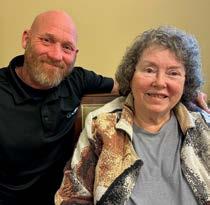


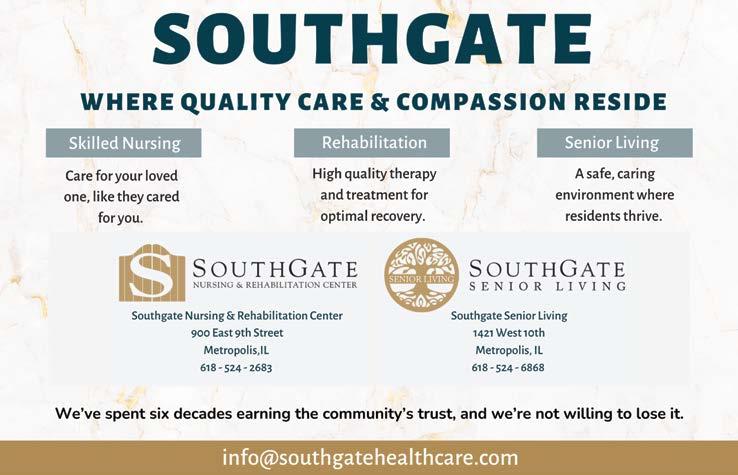



By: Carol Ullerich
Four years after WWII began, Patricia (Pat) Teas was born at Paducah’s Riverside Hospital—a place she would ultimately work. She traveled some, a cruise here and there, but always returned home to Paducah. Her maiden name was Gray; she was an only child; and she stands around 5’2” tall with bold eyes peering from behind gold-rimmed glasses.
Both her mom and dad, Mr. and Mrs. Bedford Gray, worked at Claussner Hosiery Mill on South 28th Street. During WWII, Pat’s dad served in the Army for three years, four months and two days. He was inducted October 16, 1942, and began active duty fourteen days later.
His highest grade was “PFC.” He was stationed on a sub defending Chesapeake Bay. He qualified as a rifle sharpshooter with a military occupational specialty of “Submarine Mine Loader.” His Honorable Discharge reflects receipt of the American Theater Ribbon, Good Conduct Medal and World War II Victory Medal.
In 1956, Pat’s parents bought a house on Old Mayfield Road. Pat attended Jetton Junior High before graduating from Paducah Tilghman where her favorite school subject was history. Now 75, she fell in October 2024 and hasn’t walked since. She feels no pain until she tries to walk. She cannot transfer from the wheelchair to a chair without
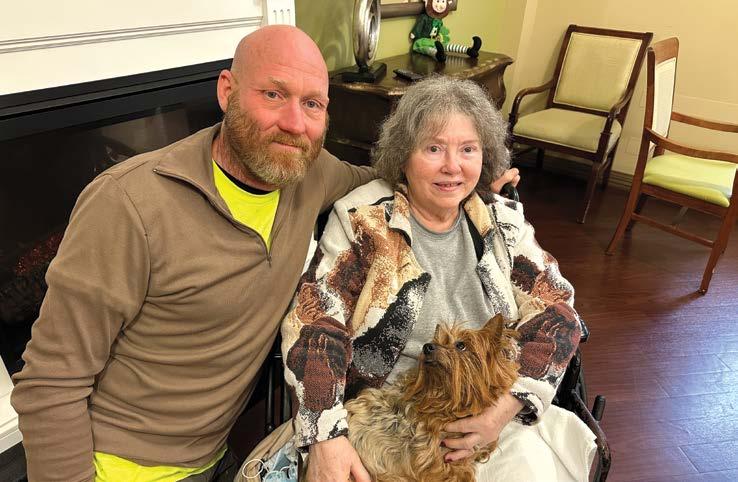
assistance. Pat is a resident of Providence Pointe Healthcare where she has a private room. Valentine’s Day 2025 was eventful—she was named Queen of Valentines.
Navigating her dementia and memory loss has been challenging for Pat and her family. There was a time she called her only son, Todd Teas, 40 times a day. She also has lupus, an autoimmune disease causing the usually protective immune system to attack healthy tissue. rightasrain.uwmedicine.org
Lupus often appears between ages 15 and 44. Because nine in ten people with the condition are women, many mistakenly believe it is unique to women; it is not. It is commonly believed lupus is impacted by genetics, chromosomes and/or hormones.
When Todd was just eight years old, Pat’s mother died. She was found unconscious in bed; CPR was started to no avail.
A cousin has compiled a book of family history. There’s also an inches-thick album of family photos. Sadly, most of those photos don’t identify who’s pictured. It’s wise to document a family’s history while memories are fresh and crisp. Advanced age, especially when combined with dementia, has a way of stealing precious memories and details.

Todd started working at the Paducah Sewer Treatment Plant in 1997. After working 23 years, he retired in 2020 from the combined Paducah McCracken County Joint Sewer Agency. While deployed in Iraq, Pat helped Todd’s wife, Deborah, care for the children, three girls and a boy—Amber, Alexis, Jaylen and Justin. Todd has been active in the National Guard 24 years (1985-2009).
Todd visits Pat after work most afternoons, usually accompanied by ‘Winston,’ a well-behaved Cairn Terrier who’s a dead ringer for ‘Toto’ of The Wizard of Oz fame. Todd and his mom are clearly close.
Pat’s husband, John Teas, died in 2013. He was a carpenter from Huntsville, Alabama, where his family was one of the first to manufacture house trailers. His family was prosperous. They owned a lumber mill and collected antiques. In addition to woodworking, John owned and worked In Paducah’s old Bunny Club. He also ran several local drinking establishments including the old Cabana Club, Boat Club and Blue Ribbon.
John was inducted into the U.S. Army in May of 1943, with a listed occupation of “Foreman Labor 356.” He was discharged in Jan 1946 with a rank of Sergeant in Company “A” of the 803rd Replacement Battalion. John received the Good Conduct Medal, World War II Victory Medal, ATO MED (Army Occupation Medal) and EAMETO MED (European Campaign Medal). Todd knows no details of his dad’s service. On his return from war, John said little, not wanting to relive the trauma. Much of his battalion died on the battlefield.
Pat was one of two dietitians at the original Riverside Hospital which had 150 beds. She continued at its successor, Lourdes, now Mercy Health, serving 306 beds, for a total of forty years.
Dietitians do more than cook. They assess each patient’s nutritional status which may include blood work, medications in case of drug interactions, gastrointestinal status, cognitive issues and physical status. A dietitian’s menu planning guides a patient along the road to recovery.
Dogs drew me to Pat. I was visiting a friend receiving rehab at Providence Pointe in early February. I brought my friend’s nearly yearold pup to visit. Walking a pup down the hallway of a medical facility always draws attention—that’s especially true in a senior facility.
Pat was sitting in a wheelchair near the main entrance. She was anxious to pet the pup tugging at the end of the leash. She’d seen the pup and his brother on a prior visit. When she moved to a new wing she no longer saw them, and missed them.
From my limited experience, dog visits brighten senior facilities. Dogs ask for nothing, but eagerly accept pats on the head and reciprocate with occasional “thank you” licks. I’ve witnessed firsthand how the lure of visiting with a pup down the hall can prompt a senior to get up and do things she didn’t believe possible!
I would soon learn Pat has had many dogs in her lifetime. A chihuahua named ‘Poncho’ lived to age 19. Then there was a German Shepherd named ‘Brandy;’ a black lab named ‘BJ;’ a foxhound named ‘Big Boy,’ and his mother, ‘Samantha.’
Pat inherited two pit bulls named ‘Sugar’ and ‘Coco.’ The dogs were deemed family members and slept with Pat in bed. When John Teas died, the two pit bulls were inconsolable. One became unruly, the other grieved herself to death, dying a couple weeks after John’s death.
The sheer number of dogs in Pat’s life demonstrates her affinity for canines. As the headline reads, Pat never met a dog she didn’t like!
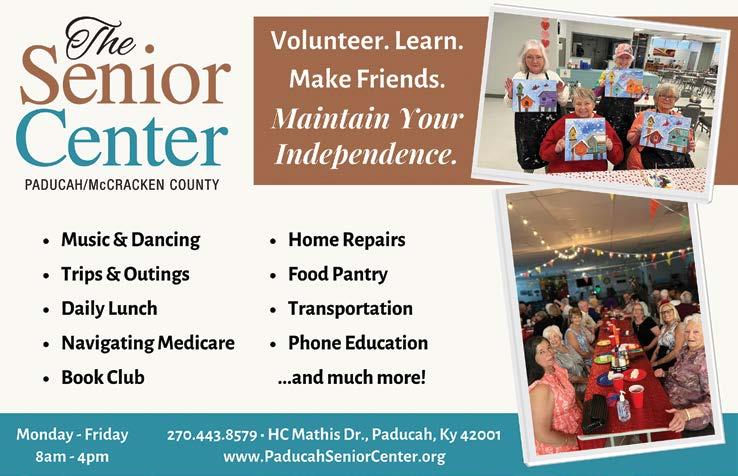

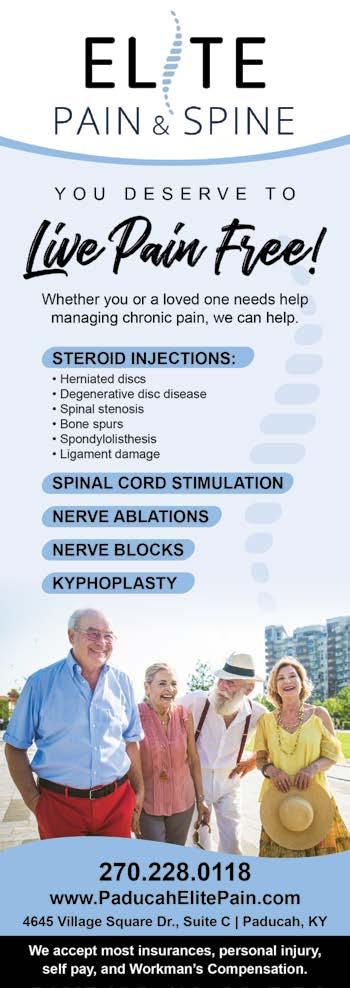
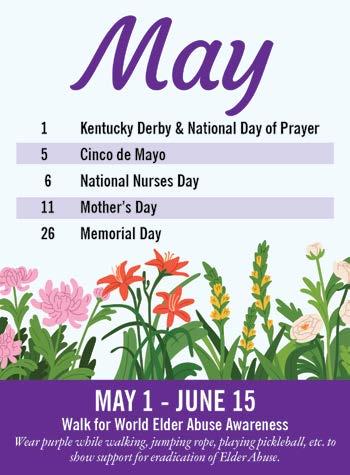

How to Play: Find 4 four-word groups, each having a link
For Example: Lettuces: Romaine, Bibb, Arugula, Iceberg Tomatoes: Celebrity, Brandywine, Early Girl, Juliet

By: Carol Ullerich
In many ways, Dr. David Thomas, a retired Paducah orthopedic surgeon, has led a charmed life. He’s been blessed with an uncanny knack for being in the right place, with the right people, at the right time.
An only child, Thomas describes his parents as “loving” and “God-oriented.” His dad had a third-grade education; his mom completed fourth grade; they attended the Pentecostal Church four times each week.
Rooted in Trigg County, when Thomas was about five years old, his parents moved the family to an Ohio farm. The home was modest—no indoor plumbing. His family did not have a fully functioning home until his junior year of high school.
To earn a high school diploma, Thomas and his classmates were given two hours to draw a world map with all nations, capitals, mountain ranges and rivers properly sited and spelled. Considering himself an “average” student, Thomas earned a perfect score in just 45 minutes. The first in his family to graduate college, he’s the only doctor.
As a high school senior, Thomas worked as a gas station attendant. A customer told him, “You don’t need to do this for life, you need to enroll in Carnegie Institute in Cleveland, Ohio, to become an x-ray and lab technician. As he drove away, the Carnegie recruiter handed Thomas an application.
As the recruiter suggested, Thomas enrolled in Carnegie. After graduating, he took a job in rural Fulton—becoming the lone lab and x-ray tech for two doctors at Hillview, a ten to fifteen bed hospital which today is an outpatient clinic.
Long before beepers and cell phones, when Thomas was needed, the hospital called the police station to relay a message to the movie theatre. Soon the words, “Little Doc go to hospital,” scrolled across the bottom of the big screen.
Other than the picture show, other pastimes in Fulton were shooting pool and attending the annual Banana Festival. This year’s version occurs September 13-20, 2025. At one time, Fulton was the “Banana Capital of the World” and the festival drew an international crowd. Seventy percent of all imported bananas passed through Fulton on railcars where they were “re-iced” with 700-pound blocks of ice.
For years, all trains heading North from the South came through Fulton. With its large roundhouse, it was the midpoint for all trains between the Southern Coast and Chicago. Once Illinois Central Railroad’s second largest division headquarters, Fulton is now an Amtrak stop.
Many locals worked at the Ferry Morse Seed Factory which closed in May, 2012, after 53 years of mailing seed around the US. It’s unclear who acquired control of Ferry Morse’s sizable seed bank.
Thomas’s career took a turn with encouragement from the two Hillview doctors. He enrolled at Kent State University as a premed student, followed by medical school at the University of Cincinnati, and then an orthopedic residency at Ochsner Clinic in New Orleans.
Married with two children, in 1968 Thomas was drafted into the US Navy during the Vietnam War. The first half of his two-year hitch was served on a ship sailing out of Newport, Rhode Island. Much of that year was spent in the Atlantic and Pacific treating all manner of injuries and diseases while triaging patients for transfer stateside.
In his second year, Thomas was assigned to orthopedic services at the Naval Hospital in Memphis. There he was fortunate to serve under two fine orthopedic surgeons. The chief surgeon, Dr. George Lucas, was a Professor of Orthopedics at the University of Wisconsin. Second in command, Dr. Phillip Nelson, was a fourthyear orthopedics resident at the Mayo Clinic awaiting his medical boards (licensure) when drafted.
Just six to eight weeks after arriving in Memphis, Thomas was treated as a staff surgeon. The operating room was busy 24/7

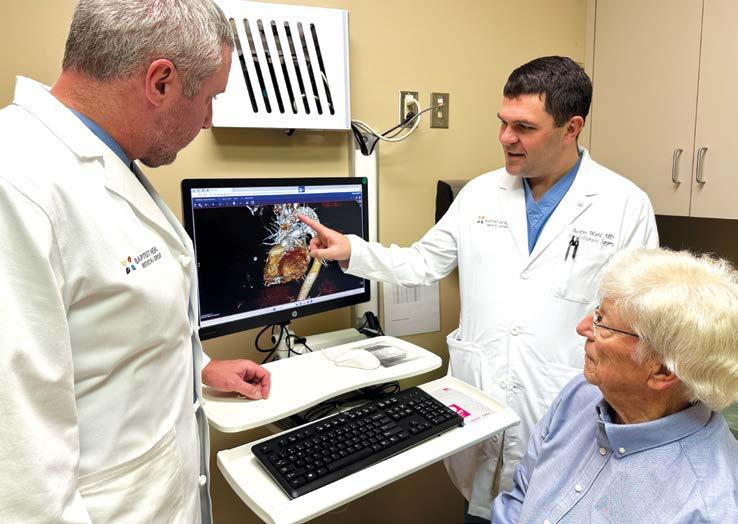
Dr. Austin Ward (right) reviews cat scan of retired Paducah orthopedic surgeon Dr. David Thomas (seated). Ward created and performed, along with Dr. Griffin Bicking, (left), both of Baptist-Health Paducah, what is believed to be the first Endovascular Total Arch Replacement in the Jackson Purchase, alleviating pressure from a life-threatening asymptomatic pseudoaneurysm on Dr. Thomas’s ascending aorta.
handling a high volume of injuries, most of them Marines arriving on direct flights from Vietnam.
While Thomas was in Memphis treating Marines, Dr. Hilary Hunt, Thomas’s future partner, was treating Army casualties at Ft. Campbell. In addition to treating battlefield wounds, Thomas mentioned female “suicide bombers” cozied up to soldiers in bars before igniting bombs. The military provided invaluable training for future civilian medical personnel.
When the base military commander asked Thomas his career plans, he revealed he had secured a cardiology residency. The commander’s swift response: “Hell boy, we’re at war! We don’t need cardiologists; we need orthopedic surgeons!”
Those words sent Thomas in a new direction. Having seen many whole-body casualties during his military service from which soldiers never recuperated, Thomas would now become an orthopedic surgeon.
His future set, Thomas completed an orthopedic residency and moved his young family to Lexington, Kentucky, becoming an
associate professor at the University of Kentucky (UK) where he was one of the first surgeons to perfect the use of polymer cement (methyl methacrylate) in artificial total joint replacement. He was also one of the first private practitioners to use the substance in patients.
Polymer cement quickly became the gold standard for joint replacement. While still in use, today’s preference is making an exact cut in the bone—now possible due to technological advances—eliminating the medical need for cement. One could say Thomas’s work as a UK researcher “cemented” his orthopedics reputation.
One weekend in the 1970’s, Thomas drove his family to Paducah where Thomas had an impromptu meeting at Lourdes/Mercy Hospital with Dr. Charles Morehead, a partner in the Paducah Orthopedic Clinic launched by Drs. Hilary Hunt and Robert Miller in 1969. During that meeting, Thomas asked Dr. Morehead if the Clinic, which was having a dickens of a time locating another orthopedic surgeon, “could use another partner.” According to Thomas, “Dr. Morehead was so elated, he hugged me, picked me up, and started carrying me down the hall!” At that point, the
Paducah Orthopedic Clinic’s trio became a quartet. The only other person doing similar work in Paducah was Dr. Sam French at Baptist Hospital.
In moving to Paducah in 1972, the Thomas family sought a medium-sized community with good schools. They settled in Paducah’s West End and enrolled the children in St. Mary’s.
The community quickly absorbed Thomas, welcoming him as team doctor for all Paducah Tilghman High School athletics. When the family subsequently moved to McCracken County, he became team doctor at the former Heath High School working with football coaches Jack Haskins and Rodney Bushong. Thomas performed all physical exams for Pirate sports teams, attended all athletic events, and counseled players.
The Paducah Orthopedic Clinic brought arthroscopy to Western Kentucky, first as a diagnostic tool and then as a minimally invasive treatment option. Curiously, major hospitals—even the Campbell Clinic in Memphis—were slow to embrace arthroscopy as the valuable tool it is today. The Paducah Clinic served as a second tier training site for arthroscopy, even training a member of the Campbell Clinic’s staff.
TIME
All four Clinic partners were avid hunters. Drs. Hunt, Miller and Morehead favored ducks, geese and quail; during waterfowl season, they wanted to be in the blind. Thomas preferred hunting deer with a bow. That meant he pulled extra duty during waterfowl season when the other three used vacation time to hunt, but they reciprocated during deer season. The three to one ratio meant Thomas often handled more on-call time during waterfowl season, but it all evened out in the end.
In the more than 30 years Thomas has lived in McCracken County he’s amassed over 200 acres—enough land without close neighbors to forego curtains, drapes, and shades. He likes the quiet and solitude, often going days without seeing anyone but family. He and wife Clareesa have been members of Lone Oak First Baptist Church more than three decades.
he was housebound during eight weeks of bedrest followed by four weeks on a walker. During those three months, Clareesa repeatedly lifted and moved Thomas, pushed his wheelchair, and offered moral support—his “encourager in chief.”
During his darker days, Thomas put his estate in order and planned for Clareesa’s future in the event of his death. She was a substantial part of his recovery. He describes Clareesa as “the most empathetic person I’ve ever met. She’s always trying to help others—a real tremendous person. Good inside and out. I may not even be here if not for her.”
Thomas had a home in Perdido Key, Florida. Wintering there in 2014, he suffered cardiac arrest while working at an off-site garage. Two friends with him were no help—neither knew CPR. All they could do was call 911 and do as told until help came.
When EMT’s arrived on scene, there was no heartbeat. Thomas was shocked five times without success. A helicopter was called to transport him to Pensacola’s Baptist Hospital. Shocked twice more during the flight, and thrice more at Baptist ER, a heartbeat was finally detected.

While Thomas’s health and career gave rise to this article, Clareesa is no minor character. A physical therapist originally from Hopkinsville and trained at UK, she moved to Paducah and began working at Lourdes. That’s where she met Thomas. After dating about two years, they’ve been married 35 years.
Throughout multiple interviews for this story, Thomas exuded unwavering optimism. Weeks later, he finally admitted there were times he doubted he’d recover from his health issues, some of which can only be termed “extraordinary.” His first heart issue arose in 1978.
One dark time was December 2023 through February 2024 when
Thomas was admitted to ICU on a respirator. About three days later he awoke, totally confused, unable to recognize Clareesa or other family members. He was discharged a few days later with a defibrillator vest and nasal oxygen and directed to have his cardiologist insert a defibrillator and pacemaker into his heart.
Thomas returned to Paducah where Dr. Mark Lineberry, his personal cardiologist at Lourdes/Mercy Paducah, inserted the pacemaker and defibrillator. When Dr. Lineberry retired, Thomas became a patient of Drs. Martin Rains and Austin Ward.
From 2014 forward, Thomas functioned well with minimal restriction. Then, in 2023, he developed cardiac arrythmia. Dr. James Baker of Nashville performed a cardiac heart ablation.
A short time later, Thomas fell climbing off a backhoe, fracturing his left proximal femur and hip. After eight weeks of bedrest, Dr. Ryan Beck repaired Thomas’s fractured femur and replaced his hip.
While receiving rehab at Lourdes/Mercy Paducah, a chest x-ray revealed an asymptomatic pseudoaneurysm on Thomas’s ascending aorta. Invisible to the naked eye, it was in the mid-chest region under the sternum and shown by CAT scan to be just 2mm (thickness of a dime) from the breastbone. Consultation with Dr. Ward, a cardiothoracic surgeon with the Baptist Health Medical Group in Paducah, confirmed the large bulge was in a troubling, critical spot and extended to the three major brain arteries—the brachiocephalic, left common carotid, and left subclavian arteries.
Thomas knew Dr. Ward had previously operated on a patient’s abdominal aorta and renal arteries in Paducah. That knowledge prompted Thomas to ask Dr. Ward to do an open surgical process to remove the pseudoaneurysm. Ward initially told Thomas, “You might not survive,” and requested time to study and think.
Ward and Dr. Griffin Bickering, a vascular surgeon with Baptist had previously performed endovascular “partial“ arches (covering one arch vessel and then lasering into it and stenting), but had never covered all three vessels to create an “endovascular total arch” which he offered to perform “as a less invasive alternative” to open-heart surgery which Thomas wanted to avoid. Dr. Ward was confident he could provide Thomas relief.
If Thomas chose to have Dr. Ward carry out his plan, Thomas would be the first in the area to undergo the endovascular total arch procedure. If the proposed new procedure did not work, on the spot, Dr. Ward had agreed to switch and perform more traditional— riskier—open-heart surgery. Thomas saw Dr. Ward throughout the summer as Dr. Ward studied and perfected the endovascular total arch procedure.
Dr. Ward had the luxury of waiting until the asymptomatic pseudoaneurysm reached 5mm—at that point, something would have to be done. In August, knowing what Dr. Ward could offer, Thomas began exploring his options. He consulted with the Cleveland Clinic, Vanderbilt University Medical Center, and St. Thomas Hospital (Nashville, Tennessee). Each realized surgery was needed, but deemed the location—against the breastbone and scar formation from prior heart bypass surgery—very—maybe too—risky.
The Cleveland Clinic declined to pursue surgery. St. Thomas proposed a two-stage surgical procedure with a high risk of mortality. Vanderbilt proposed an extensive two-stage procedure which would likely have long-term effects. Neither option appealed to Thomas.
In September, Dr. Ward proposed a sleeve procedure with fenestrations (holes) and stents. In October, CAT scans showed the pseudoaneurysm was still growing—and nearly at the 5mm danger zone—a decision had to be made. Being a surgeon himself, Thomas feared the bulge would rupture and knew if it did, death would be imminent—no more than thirty seconds.

On November 6, 2024, after studying the situation nearly a year—from January 2024, until November 2024—and confirming with medical technology companies their devices would perform as needed within the aortic arch, Ward began the proposed procedure, agreeing with Thomas if the proposed plan did not work, he would perform open-heart surgery.
Thomas was eager to minimize time in surgery, recovery and rehab. Ward’s proposed procedure appealed to Thomas because the chest was not opened, making it less risky. Plus, Thomas’s memory of the pain following prior bypass surgery, coupled with time on a respirator, was all too vivid. Finding none of the options offered by the hospitals acceptable, Thomas opted for Ward’s procedure.
Thomas is grateful for Dr. Ward’s innovation in creating an “amazing—less invasive”— procedure in consultation with Dr. Griffin Bicking and Medtronic—a manufacturer of pacemakers and stents.
Dr. Ward proposed fabricating a vascular graft to cover the asymptomatic pseudoaneurysm and allow placement of one stent in each of the three main vessels supplying blood to the brain. Something similar had been done
in renal arteries, but only a few times in Thomas’s context. The procedure Ward suggested is thought to be the first of its kind in the Jackson Purchase and one of the few performed in the United States.
Dr. Ward was confident in his skills and his well-considered plan. Thomas doubts he was the “perfect patient” and is certain he wasn’t a “typical one.” As a doctor, Thomas knew the questions to ask and could have second-guessed Ward. When Thomas asked Ward whether he was confident in his plan, Ward responded, “I’m totally confident.” That strong response gave Thomas confidence—precisely what a patient wants to hear from a doctor. If Ward’s procedure worked, Thomas would be home free in an incredibly short amount of time—avoiding both lengthy surgery and recovery. If the proposed technique failed, Dr. Ward would switch—midstream—to traditional open-heart surgery. Thomas saw it as a win-win scenario and chose to move forward with Dr. Ward’s novel approach.
First, markers (thin wires) were placed in the three aortic arch arteries to identify each artery supplying blood to the brain. Second, instead of standard open-heart surgery, two incisions were made in the groin area and four in the chest/neck area. Third, Dr. Ward inserted a stent graft from the femoral artery, up the abdominal aorta, across the aortic arch and into the ascending aorta above the aortic valve and Thomas’ previous bypasses. This maneuver covered and blocked the three arteries to the brain. Dr. Ward also placed Dr. Thomas on a heart lung bypass machine to keep blood flowing to the brain during the procedure and while reestablishing blood flow to the brain arteries.
Fourth, using a laser, Drs. Ward and Bicking drilled three 0.7mm fenestrations in the vascular sleeve to allow them to see the previously placed markers and confirm their location via arteriogram. The three holes were enlarged to receive the three stents—each going to one of three blood vessels supplying blood to the brain to enable normal blood flow to the head and entire body.
Finally, with the procedure complete, all connections were confirmed by arteriogram and Thomas was wheeled on a gurney to ICU with no ventilator. Less than one hour later, Thomas was awake and oriented when Drs. Ward and Bicking visited him in the recovery room. Thomas recalls “Ward grinning ear-to-ear. When Thomas moved his hands and feet, and contracted his leg muscles, doctors and patient were thrilled.”
Once the asymptomatic pseudoaneurysm was closed off from the heart, rupture was no longer a concern. In time, any blood inside the pseudoaneurysm will clot and slowly shrink but probably won’t fully disappear.
Surgery began at Baptist Health-Paducah at 7:00 a.m. November 6, 2024. It concluded about four hours later at 11:30 a.m. Four hours post-surgery, Thomas was up and walking down the hall without pain medication. A day later, he was transferred to a regular room. A day after that, with some physical therapy, Thomas was discharged to home.
Thomas said treating his type of asymptomatic pseudoaneurysm would normally require about ten days hospitalization followed by two months of rehab. Given the precarious position of the pseudoaneurysm—so close to the breastbone and significant scar tissue—finding a hospital willing to do the surgery was difficult. Had it been attached to the breastbone—rather than

a scant 2mm from it—opening the chest could have ruptured the pseudoaneurysm causing Thomas to bleed out in seconds. Without Dr. Ward’s solution, doing nothing meant certain death; with it, Thomas spent three days in the hospital with no real recovery time and was back to his normal routine with self-directed PT on discharge.
Thomas is ecstatic with the results of Dr. Ward’s “incredibly complex procedure.” His glee is not only for himself; he knows other patients needing similar surgery will benefit from the streamlined option Thomas is calling, “The Ward Procedure.” Thomas believes Dr. Ward deserves “broad community exposure” for his willingness to create a new procedure and successfully complete it with a hand-picked surgical team.
While Thomas enthusiastically sings his surgeon’s praises, Dr. Ward downplays creating the novel procedure, although he does hope to present Thomas’s case at the Southern Thoracic Conference at Amelia Island in November 2025.
Dr. Ward also acknowledges, “this was an incredibly complex procedure, and there were several ways it could have failed. The type of failure would have determined whether Thomas could have survived the procedure to leave open-heart surgery as a subsequent option. The biggest risk would have been a stroke from the procedure, which Thomas likely would have survived, but had stroke-like deficits in the wake of the procedure.”
patient he often asked the family for prayers in addition to his own. During the entirety of his multi-decade career as a private practitioner, he lost only one post-op patient. He was not so fortunate with the tremendous number of war injuries he treated.
Thomas turns 89 in April 2025. He believes God still has a plan for him. He’s encountered multiple serious health issues and survived all. In 2014, he officially died three times in the span of thirty minutes in that Florida garage, even coming back from cardiac arrest. He withstood hip surgery, two cardioversions, cardiac ablation, inguinal hernia repair, two pacemaker/defibrillator replacements, electrical shock to convert from AFib to normal sinus rhythm; six-vessel open heart bypass surgery; and, “the Ward Procedure” in late 2024 to resolve the asymptomatic pseudoaneurysm. That’s a lot of procedures for doctors to perform, let alone for one patient to survive.
Thomas considers his current physical routine “fairly active.” He’s selfsufficient and independent, requires no walker or cane, and is restricted only in the amount of weight he can push or lift. He no longer bales hay or repairs fences as he did when he was younger. He performs light chores, using equipment to do heavier outdoor tasks. No longer an avid deer hunter, he travels by four-wheeler and observes wildlife from a deer stand for pleasure.
Thomas has strong religious beliefs and convictions. He acknowledges before performing surgery on a critically unstable
He lectures on The Crucifixion; Creation of the Universe; Creation of Man; Israel and Its Enemies; The Twelve Disciples; Missile Types and Ranges; Where is the Garden of Eden?; and The Axis

of Evil. For a future talk, he’s exploring quantum components of artificial intelligence. Giving lectures stimulates him, especially when followed by lively discussion.
While Thomas practiced medicine, his children competed in saddlebred horse shows. For several years, the family owned Golden Meadows Farm, a fully-staffed horse farm in McCracken County with a 100’ x 300’ barn complete with indoor riding arena, 22 stalls, assorted cats from the humane society and others that just appeared, and about 20 horses including a World Champion (“Evening in New York”) and a World Champion Reserve (“Saber Stiletto”). Weekends were spent competing coast to coast.
As a UK professor, Thomas earned his pilot’s license, logging hundreds of hours in the cockpit. He’s both instrument and multiengine rated. I asked whether his love of aviation was launched during his military career. He said he was always interested in planes. Aviators he treated routinely offered to take him up, but he never accepted their offers. It would have required time, completing training on using an ejection seat, and being checked out in the compression chamber. He never made the time while in service, and age won’t permit it now.
To minimize his time on the road going to horse shows, Thomas purchased a Twin Beech six-passenger aircraft allowing him to work full-time at the Clinic while his wife and children drove to shows with the horses, trailer, and tack. Thomas flew to and from the shows minimizing time away from the busy orthopedic practice.
In 1995, just ten minutes from completing an orthopedic procedure, Thomas developed severe chest pain in the OR, suffering a spontaneous heart attack. Dr. Lineberry, performing surgery across the hall, was called to Thomas’s OR. Lineberry arrived with a gurney and waited at Thomas’s elbow, prepared for any eventuality. Thomas completed the procedure and Lineberry took Thomas to the cath lab where cardiac catherization revealed significant multi-vessel occlusions. Thomas was immediately transported to St. Thomas in Nashville where he underwent sixvessel bypass surgery. This episode ended Thomas’ career as a surgeon and his days as a pilot.
Since mandatory retirement, he’s restored vintage cars, taken a welding course at West Kentucky Community & Technical College, and earned his real estate license. Before the age of ZOOM, he even considered earning a law degree, but that would have required commuting to Carbondale for class. Hoping for nine lives—like a cat—he acknowledges he may have used eight of those lives, but “believes God is keeping him on Earth for a reason.”
Thomas remains abreast of current medical practices—recently attending an orthopedics medical conference—critical since he still serves as a medical consultant and gives presentations to small groups. He deems himself fortunate and appreciates his success and unique accomplishments.
Only God knows his future—which Thomas accepts without question. For him, “everyday is a gift. I live day by day and hope for the best!”


For Example:
Romaine, Bibb, Arugula, Iceberg
By: Carol Ullerich
Three-year-old Thoroughbreds entering the 151st Kentucky Derby will answer the call to the post at 6:00 p.m. CT, Saturday, May 3, 2025, at Louisville’s Churchill Downs. The track is named after John and Henry Churchill who leased the track’s land. The Derby, a Grade I stakes race, is the first leg of the American Triple Crown and has been run at the historic track since 1875. The Derby is followed by the Preakness Stakes at Pimlico Racecourse in Baltimore, Maryland, the third Saturday in May, and the triple crown concludes five weeks after the Kentucky Derby with the running of the Belmont Stakes, at Belmont Park in Elmont, New York. The Derby was inspired by England’s Epsom Derby and the French Grand Prix de Paris.
A garland is presented to the winning jockey and horse. It’s been an official race symbol since 1925 when the race was officially dubbed, “The Run for the Roses.” It features 426 ‘Freedom’ roses sewn onto a cloth-backed blanket created by a team of about ten volunteers over the course of about 50 hours. The Kroger Company’s Master Floral Designers have created the garland since 1987. The finished garland weighs about forty pounds and police escort the floral creation to the Twin Spires.
The storied race is so special it has not one, but four, trophies. The owner of the winning horse receives a gold trophy. The value of the 67 ounces of gold in that trophy is about $80,000. The trainer, jockey, and breeder each receive a half-size silver replica of the gold trophy.

Not surprisingly, the Derby is the most-attended horse race in the U.S. and is nicknamed “the fastest two minutes in sports.”
Founded by Meriwether Lewis Clark Jr., grandson of explorer William Clark, the length of the Kentucky Derby is 1¼ miles and is the longest continuously contested sporting event in America.
The Derby’s official drink is the Mint Julep, a combination of bourbon, mint, and sugar. Woodford Reserve is the Derby’s signature bourbon. Churchill Downs serves 120,000 Mint Juleps on Derby Day, using 1,000 pounds of mint; 60,000 pounds of ice and 10,000 bottles of bourbon. Each Julep costs $6.99, unless it’s served in a gold cup—that price jumps to $2,500.
The 146th running of the Derby was unconventional in every sense of the word. It wasn’t run the first Saturday in May of 2020; rather, it was delayed until September 5, due to COVID. A much smaller field generated less than half the typical handle (wagers) surrounded by empty grandstands. Outside Churchill Downs, protesters demanded police officers involved in the death of Breonna Taylor be arrested. The next Derby with customary trappings, did not occur until May 7, 2022, when ‘Rich Strike,’ running at 80-1 odds from the extreme far-outside post with Sonny Leon in the saddle, took an upset win before an audience of 147,294.
Secretariat holds the fastest Derby finish at just 1:59:40. Only two other horses, Monarchos and Northern Dancer, have crossed the finish line in under two minutes.
A lady is not truly dressed for the Derby without a spectacular hat. The custom started at the first Derby when women sported their best attire, topped off by an incredible hat, to demonstrate status and fashion sensibility.
Jockeys Eddie Arcaro and Bill Hartack share honors with the most wins at five each. Bill Shoemaker is next in line with four wins. He’s also the oldest jockey to finish first; at age 54 in 1986, he won aboard longshot ‘Ferdinand.’ In contrast, the youngest winning jockey was Alonzo “Lonnie” Clayton, an African American 15-year-old who won aboard ‘Azra’ in 1892. Fifteen horses ran in the first Ky Derby in 1875. Twenty-three competed in the 100th running in 1974 won by Cannonade. The crowded field prompted many to ask whether 23 was too many horses in a single race, leading Churchill Downs to cap the Derby Field at 20, even though the standard limit on entries is just fourteen at other major tracks. The Kentucky Oaks, a race for fillies the Friday before the Saturday Derby at Churchill Downs, is capped at fourteen. It is shorter with one less furlong before the first turn.
Resources: Is it time for the Kentucky Derby to stop running 20 horses? By Jason Frakes, courier-journal.com; Kentucky Derby Trivia, https://www.twinspires.com; The Journey of the Roses, krogerstories.com; Kentucky Derby Winners, britannica.com.



by

By: Carol Ullerich
If you’re a farmer or took Home Economics in high school, you’re probably familiar with “the county extension office.” But you probably don’t know all the classes and opportunities offered today. Youth for example, can participate in shooting sports, Robot Club, and Lego Club. They can even play video sports like bowling, golf and volleyball. If you live in town and never experienced farm life, you may be unaware of this treasure trove of free expertise to make life richer and easier. Check it out!
The McCracken County Cooperative Extension Office is located at 2025 New Holt Road, Phone: 270-554-9520; mccracken.ext@uky.edu. It’s your link to the University of Kentucky’s Martin-Gatton College of Agriculture, Food and Environment. We’re focusing on the McCracken County Office, but every Kentucky county has an extension office connecting residents with resources, research and innovative solutions. Adair Baysinger is McCracken County’s Extension Director.
In addition to the Extension Office, Paducah and McCracken County are also connected to UK through the West Kentucky Community and Technology College (WKCTC), 4810 Alben Barkley Drive, and, the Paducah School of Art & Design (PSAD), 905 Harrison Street. Fact #1: Paducah is home to the Stanley and Karen Pigman College of Engineering, the only Engineering School in the nation located on a community college campus.
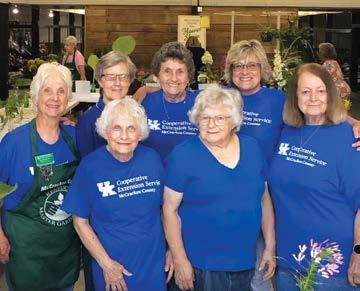
The Extension Service receives funding from multiple sources. Federal funding comes through the U.S. Department of Agriculture; state funding through the UK budget; and, local funding from the McCracken County Fiscal Court. Fact #2: Decades ago, McCracken County voters realized the value of having a local Horticulture Agent paid by the county—not every county has one. Look at your county tax bill—“EXT Service” is the amount you contribute to the Extension Office. Other funds may come from local sources, grants or contracts.
McCracken County currently offers four Extension Program Areas: Agriculture & Natural Resources, Family & Consumer Services (previously known as “Home Ec” which includes Nutrition Education Programming), Horticulture, and 4-H Youth Development. Let’s delve into each area.
If you attended Ag Day and/or the Harvest Festival at the Extension Office last fall, you saw the work of Ag Agent Gracey Moffitt and other agents. Fact #3: All current McCracken County Extension Agents are women. Gracey created partnerships with surrounding counties to offer educational programs; she also partnered with Soil Conservation and Kentucky Farm Bureau Boards; and, she revitalized the Ag Advisory Council.
Agent Kelly Alsip, a Heath High grad, offered monthly “laugh & learn” programs geared toward children ages 3-5 at the McCracken County Library; she hosted the Taste of McCracken and presented, with Hickman and Calloway Counties, Global Kitchen programs highlighting six cultures. She regularly partners with the McCracken County Health Department to present the Diabetes Series.
During this year’s lead up to Mardi Gras, Kelly offered Cajun Cooking classes taught by Louisiana native Samantha Fontenot. The menu featured Alligator Sauce Piquante with Smothered Okra. Kelly is the Purchase Area Family & Consumer Sciences President.
Senior NEP Program Assistant Stephanie Caldwell collaborates with the Family Service Society; KY Cancer Program; McCracken County
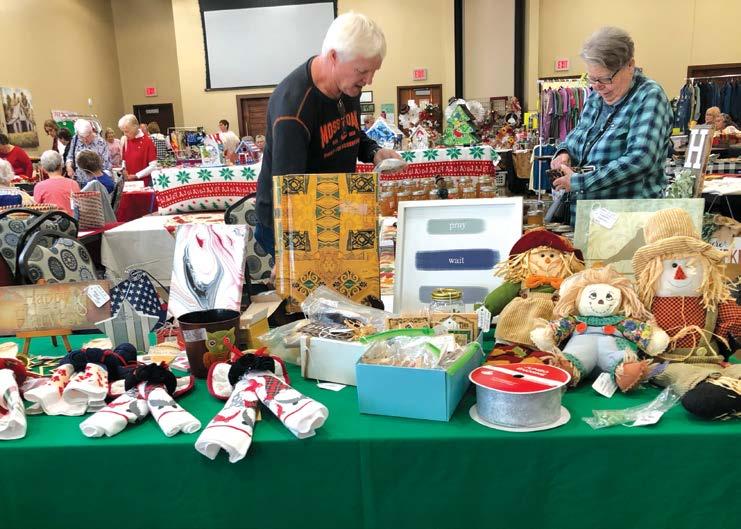


Drug Court; Senior Center; Goodwill Opportunity Center; Scholar House of Paducah; Oscar Cross Boys & Girls Club; and The Zone to teach the community how to prepare nutritious meals. Partnerships with local schools led Stephanie to receive a statewide award for having the Outstanding Youth Program.
Horticulture Agent Mary Dossett, along with Assistant Savannah Gilbert, oversee the Master Gardener Toolbox Series the first Tuesday of each month. 18 new Master Gardeners graduated from the most recently completed training taught by Mary and Savannah. They have also given programs to Paducah garden clubs; arranged an Office Seed Swap; taught Gardening 101; hosted Invasive Plant Training; participated in Planting Day at the Goodwill Opportunity Center; organized the Horticulture Walking Club on the Greenway Trail; worked with summer youth camp at the Inland Waterways Museum; and taught an 8-session Gardening Program to female inmates at the McCracken County Jail.
Rachael Davis, Lisa Dodson, and Heather Hunter are McCracken County’s three 4-H agents. They participate in 4-H Camp; the State Communications Contest; Career Exploration Week; Smithsonian Stories 4-History Project; Backpack Program through Eckstein Foundation Grant; Baking Club; Shooting Sports Program; Poultry Club; Robot Club; Rocket Club; Project Days; Lego Club; County/State Fair; HAM Radio Club; Teen Club; Paws & Santa Claus Fundraiser; and ongoing partnerships with local schools. Adults interested in any of the named topic areas are urged to share their expertise by volunteering. A large number of volunteers is needed for overnight camp. In 2024 there were 166 campers and volunteers; more are expected this July 28 - May 1, 2025. You must pass a background check and you will sleep in a cabin with 20 kids. Contact Extension for the experience of a lifetime!
The County Extension Council identified the following needs to be addressed in McCracken County: Ensuring access to affordable nutritious food for individuals and families; Minimizing youth substance abuse; Youth life skills training opportunities; Addressing food insecurity and diet-related chronic diseases; Support for substance use addiction, prevention and recovery; Strengthening youth workforce readiness; Sustainability of family farms; Improving access to mental health and well-being resources; Strengthening youth/adult or mentorship relationships; Support local and small businesses; Reduce youth obesity through nutrition education and/ or exercise; Social, emotional, and market support for locally grown and produced food; Building financial literacy and/or resource management skills; Behavioral education for adults working with 4-H; and, Strengthen/Support local food/ag industry.
Whatever your current interests, or desire for a new hobby or skill, there’s something for you at Extension. Since February I’ve attended the Master Gardener Toolbox Series; Cajun Cooking; Virtual Voyagers (kid’s gaming group); and 4-H Baking Club—all without even trying. No matter your interests, you’ll learn something at Extension! And, if you’ve got a skill, offer to share it with the community. Peruse a monthly calendar of Upcoming Events at mccracken.ca.uky.edu to start learning and sharing.




By: Richard Abraham
Most of us spend our time focusing on external things to help us feel better. Pain affects millions of individuals and pain relievers are the ‘go to’ solution for many seeking pain relief.
What if I told you we have endorphins within our bodies? Guess what their job is? It’s Pain Relief! Exercise naturally releases endorphins to do what they were made to do. They were made to help you feel better. They help your body manage pain and stress. And, they boost your mood.

Here are some facts to help your mental, physical and spiritual health.
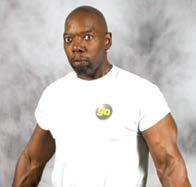
1. Your body manufactures 200 billion blood cells every day.
2. Your body replaces all the blood in your body every 120 days.
3. Your skin is completely replaced every 1 to 3 months.
We may be older, but we can still appreciate the wonderful body we possess. Maybe we can now understand its power within us. I don't know about you, but I can hardly wait to go Break a Sweat!
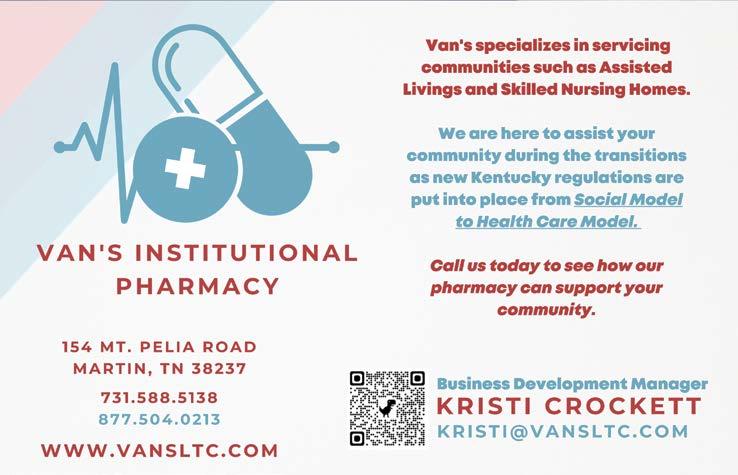
By: Carol Ullerich
Pickleball combines facets of tennis, and ping pong, but draws most heavily from badminton. It’s taken all ages across the US by storm, especially seniors. Because the sport is so widely enjoyed, there’s a move afoot to ensure everyone who wants to play gets to play. As a result, play is occasionally restricted to seniors or those 55+ at some venues. Churches often reserve certain hours for “members only.” April being National Pickleball Month, I set out to learn the why and how of the world’s fastest-growing sport.
In the summer of 1965, three dads—U.S. Congressman Joel Pritchard of Bainbridge Island, Washington; neighbor and businessman Bill Bell; and Barney McCallum, an inventor and entrepreneur—designed the game now known as “pickleball,” to keep their kids busy in summer. The trio could not find a full set of equipment for any one sport, so they cobbled together items from several games commonly found in homes to create an easy to learn game yielding extraordinary benefits for devotees. McCallum, a marketing genius, refined the Pickleball rules and promoted the game.
TIMELINE
The sport’s trajectory has been phenomenal. Play began in 1965, with the first permanent pickleball court being built in Pritchard’s backyard in 1967. Pickleball was officially recognized as a new sport in 1972. The US Amateur Pickleball Association formed in 1984. By 1990,
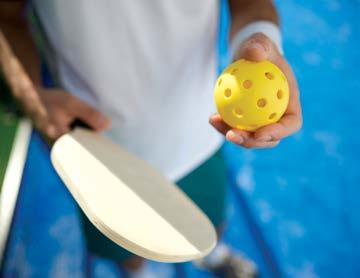
pickleball had spread to all fifty states. And, by 2022, there were 8.9 million players—six years or older—in the US.
Two potential answers. The Pritchard’s dog was named “Pickles,” but, USA Pickleball research has confirmed the lively puppy who habitually nabbed the ball from the court and carried it in its mouth, was not born until 1968, three years after the game was invented and named. Plus, the Pritchard family maintains “Pickles” the dog, was named for the sport, not the other way around.
Joan, Pritchard’s wife, rowed in college. There is no question she named the new sport “Pickleball.” The only question is the sport’s namesake. Joan maintains she based the name on “the thrown-together leftover non-starters in the ‘pickle boat’ of crew races.” Mystery solved! The sport was not named for a mischievous Cockapoo born three years in the future; the name comes from the rowing term, “pickle boat.” Why is it called pickleball? How did pickleball get its name?
You’ll need a paddle—larger and heavier than a ping pong paddle, but smaller than a tennis racket with a smaller sweet spot; a net—similar to one used for volleyball and about two inches shorter than that used in tennis; a ball, smooth and hollow with holes—slightly larger than a whiffle ball; and, appropriate shoes—rubber tread recommended (tennis or basketball shoes will work, but check rules of location where you’re playing). Finally, a court. A tennis court measures 78’ long by 36’ wide; a Pickleball court is just 44’ long and 20’ wide. Both tennis and Pickleball can be played indoors or outside. Tennis can be played on grass, clay or hard surfaces; outdoor Pickleball is usually played on concrete or asphalt (or indoors on a wood floor).
Another word about the paddle—Dollar Tree sells an all-plastic version with a ball for $1.25. I showed experienced players the item and asked for comments. Without hesitation, one advised steering clear of plastic and wood paddles, saying the impact on the shoulder and upper arm will be too great. Fiberglass (around $200) was preferred by one player who deems it more flexible. Carbon fiber is another option—described as lighter and stiffer, but offering more power and control. Before investing, talk to players and try out different models. Some locations have paddles and balls to use while deciding whether to pursue the sport.
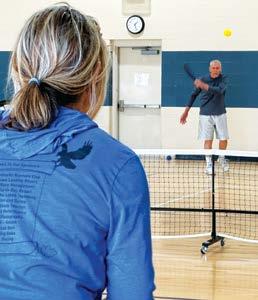

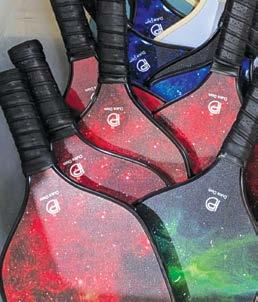
The biggest difference in Pickleball and other racquet sports is probably the non-volley zone on a Pickleball court—oddly nicknamed the “kitchen.” It’s the first seven feet on either side of the net and akin to badminton’s no-service zone. If the first ball of a game, or first return of a ball, is hit while standing in the kitchen, it’s an automatic fault with a point awarded to the opposing player/team. Whether starting, or in mid-play, no volleys can be made while standing in the area of the kitchen, or on, a kitchen line—unless the ball bounced into the kitchen prior to the volley during the same play.
Six decades after the game was introduced on a badminton court, Pickleball courts can be found in retirement communities, community parks, churches and senior centers across the country. Why has Pickleball become so popular?
I met Elle Hendrix in 2024 when she led a stretching session at a senior health fair in Graves County. She’s the Wellness Works Coordinator at Murray-Calloway County Hospital’s J. Stuart Poston Center for Health & Wellness (the Center), 716 Poplar Street, Murray. She mentioned the Center was about to open indoor Pickleball courts in response to a member survey requesting Pickleball more than anything else. That revelation prompted the Center to install a new hardwood floor to accommodate a volleyball court and two Pickleball courts. Continuous Pickleball play is unavailable at the Center because the multi-use room hosts other fitness activities including Zumba, cardio toning, spin, spin core, pilates and bodypump.
A Senior Center Membership is $41.00 per month and allows access to a range of services useful in both maintaining current fitness and post-injury rehabilitation including aquatics in an indoor heated pool, massage therapy, group fitness and personal training. Other activities are Pickleball (reserve court ahead of time), a fitness room and various classes. Check mcchwellness.com for fee specials based on packages for physician referral, age, corporate, military, clergy, MCCH employee and family. To try out the Center before committing, a day pass is $8.00. Watch for an occasional offer of a 10-visit Guest Pass for $64.00. Use of Center facilities is generally limited to those age 14 and older; an exception is made for children enrolled in swim class and accompanied by an adult. A KidZone is available for children between 6 weeks and 9 years of age for up to 2 hours of childcare while parents/grandparents work out.
Members may reserve a Pickleball court at the Center Monday through Friday for 30 or 60 minutes of play between 10:30 a.m. and 3:30 p.m. A game usually takes 15 to 20 minutes, allowing four games to be played each hour.
To allow more play, two Murray churches offer indoor Pickleball courts with no charge or required membership, but there may be a wait to play. One retired player said he plays at multiple venues and has no difficulty finding an open court. Play occurs at First Baptist Church, 203 South 4th Street, Murray, Monday from 9:00-11:00 for seniors 55+. Advanced players take the court Monday and Thursday nights from 6:00 p.m. to 8:00 p.m. Enter thru back of Family Life Center off Third Street. Play occurs at First United Methodist Church, 503 Maple Street, Murray, Wednesday and Friday from 9:00 a.m. until 11:00 a.m. Additionally, the Murray-Calloway County Senior Citizens Center (a/k/a Weaks Center), 607 Poplar Street, Murray, offers Pickleball play for those 55 and older from 2:00 p.m. to 4:00 p.m. on Tuesday and Friday. Dan Cunningham, a seasoned player, teaches a class for seniors Friday morning from 8:00 until 9:00 a.m. All three sites provide balls and paddles for novice players to use on site; none take reservations.
To help me gather information for this article, Elle reserved a court at the Wellness Center and invited two foursomes—four men and four women—to play and chat. Seven players participated, allowing me to pepper them with questions on all aspects of the sport.
According to Elle, the Center will celebrate its 25th anniversary in October 2025. She hopes Pickleball will play a big role in the festivities. Soon after the new indoor courts opened for play, a class was offered for Pickleball novices to learn good fundamentals. The Center provides Pickleball paddles and balls at no charge and is considering purchasing a serving machine.
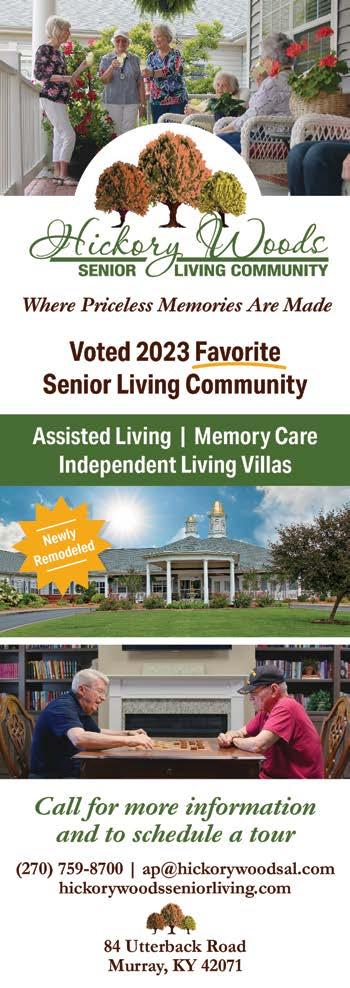
For 70-year-old Marge, a military veteran who was in the Pentagon on 9/11, Pickleball was “addictive” from the get-go. She plays every day she can; “waiting” to take the court is the worst part for her. Elle commented this mixed foursome was the first time she’d seen a player not wearing a knee brace. All four players were wearing knee braces, Marge’s just wasn’t visible.
Marge recommends taking a couple free classes at the Weaks Senior Center before beginning to play. She’s aware the sport can be dangerous, especially when a serve has been recorded whizzing by at 1500 rpm, slower than a tennis ball but hard enough to hurt. She also suggests wearing shoes that grip the floor. She wears a jogging shoe that enhances her balance. To stay safe, she’s adamant players watch the ball, not other players. “Don’t take your eye off the ball!”
Marge said, “I never thought I’d be doing this in my 70’s. One doesn’t have to be athletic to play, and it’s good to break a sweat.” She prefers playing indoors, “it’s too windy outside and too hot in summer.” While she fears falling on concrete or asphalt, she doesn’t fear getting hurt. She describes the indoor wooden Pickleball court as “more forgiving.”
Many seniors flock to the game saying courts are accessible and the game is easily learned. Seniors like the fact that it’s low-impact, making it easier on joints, and causes less arthritis and mobility issues, while ramping up cardio, building muscle, and improving flexibility and balance. Decreasing the risk of falling is critical to remaining independent. The sport also keeps seniors actively engaged, mentally and physically, which minimizes feelings of isolation and loneliness. Since the game is most frequently played as doubles, partners interact, communicate and work together. There’s talk with the opposing team. I heard a lot of banter on the court.
Delana has been playing only four months. She’s still learning the sport, but strongly suggests conditioning before play; “otherwise, you won’t enjoy yourself.” Another player mentioned being injured soon after taking up the sport. Seniors may be fooled into thinking Pickleball is easier than it looks.
In one hour, Marge and Delana played four games against Myra (a beginner), Eric and David—that’s consistent with the 15-20 minutes usually allotted per game.
David, 71, has been playing Pickleball two and a half years. He was introduced to the sport by a friend of twenty years. David is retired, a member of the Murray Pickleball Association, and typically plays three times a week—in multiple locations—the two churches, the Center (he and his wife are 20-year members), and the Weaks Senior Center too.
Demand for more local courts continues growing. In December 2024, ground was broken for the Rudolph Pickleball Complex at the corner of Arcadia and North Eighth Street in Murray, with space for ten outdoor courts. An unveiling of Phase I (5 courts) is set for 5:30 p.m., Monday, April 21, 2025. Fundraising continues for Phase 2 (another 5 courts). The Murray Pickleball Association (MPA) is hosting Paddle Mania, a regional tournament for men, women, singles and doubles, April 25-27, in Murray’s CFSB Center.
Pickleball appeals to David because it’s not as physically demanding as tennis and racquetball which he played when he was younger. He likes Pickleball’s smaller court—he’s less apt to overstretch and overreach his abilities—and the sport’s social aspects are attractive. He found the weather in the one outdoor tourney he played “challenging.“
Rules are learned quickly while playing. Nuances can be explored through on-line videos and forums. Court size can be adapted to player abilities/limits. Play builds cardiovascular health and endurance. Rallies use quick bursts of energy. Constant movement increases muscle strength and flexibility. Regular play may help maintain healthy weight, lower diabetes risk and improve overall fitness.
Regular physical exercise also releases endorphins—the “feel-good” hormones that can alleviate depression and anxiety. The game’s social aspect stimulates the brain and may develop emotional support.
Formulating Pickleball strategy stimulates the mind. Hand-eye coordination, needed to return the ball, often dwindles with age. Using it may improve balance and agility, reduce falls and sharpen reflexes. Maintaining focus, especially while playing doubles, may slow agerelated mental decline.
Senior communities and centers recognize the sport’s benefits. By developing opportunities for play they promote a sense of community and encourage participation, both of which create an active and healthy lifestyle. Clubs and Leagues provide structured play for seniors where they can hone skills, play against others of a similar skill level, and share a newfound passion with like-minded seniors.
Tournaments allow seniors to display skills and connect with potential opponents. Instructional online videos demonstrate aspects of the sport a player may have wondered about or hadn’t considered. You Tube, Facebook and Instagram offer platforms to improve one’s own game while learning from others.
Players are grouped by ability. While competitive, the emphasis is on sportsmanship and fun with local divisions feeding regional and national tournaments. The National Senior Games and USA Pickleball hold senior-only tournaments. One 73-year-old woman described senior play as “exercise disguised as fun.” A 75-year-old man who switched to Pickleball when a knee injury prevented him from playing tennis said, “I’m in better shape now than I was at 60.” These quotes confirm staying active, social and competitive is not age-dependent.
For all its advantages, Pickleball may not be for everyone. It’s fastpaced, carries a potential for injury, and can be highly competitive. A modicum of equipment is needed, but lack of available court space can be a deterrent. Here are a few points to consider before diving in fullthrottle.
Injuries (sprains and strains from failing to fully warm up, lack of stretching, tendonitis, joint pain, improper footwear, and overestimating physical ability) do happen, especially when going toe-totoe with an experienced player. Warm-up and stretch to minimize injury before taking the court and cool-down post-play.
At a minimum you need a paddle, a ball and shoes, and maybe a club membership, although many churches and communities allow free play. While more courts are being created, there’s still a finite number
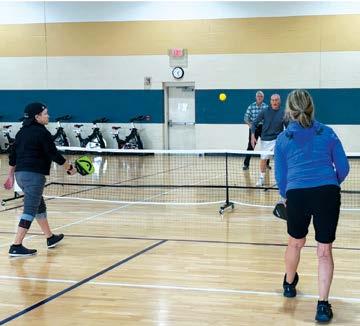
for an eager population growing by leaps and bounds. Book court time to ensure you get to play.
Yes! If you watched the 2025 Super Bowl, a top-rated commercial featured Willem Dafoe and Catherine O’Hara hustling younger, fitterlooking players to a Pickleball match with the prize--a low-calorie Michelob Ultra beer. Why did that happen? In part because in 2024, USA Pickleball, the sport’s governing body, declared Pickleball “America’s fastest growing sport for the fourth consecutive year.” Michelob has already planned another Pickleball commercial for Super Bowl 60. Pickleball is also the set-up for a TV weight loss ad promoting NOOM.
If Madison Avenue’s interest doesn’t convince you, the sport has also attracted the eye of pro athletes turned investors including former New Orleans Saints quarterback Drew Brees. He just opened a swanky Pickleball facility in South Mississippi. Himself a Pickleball-playing enthusiast, Brees recognizes Pickleball is a lifelong physical activity that can begin in youth and continue well into old age. Why did Brees build the facility?
• The sport appeals to all ages, especially seniors.
• Pickleball promotes a good quality of life, including happiness.
• Pickleball’s growth has exploded.
• Brees, an avid Pickleball player, is simply sharing his passion with others.
• Brees is ensuring all have access to the game.
• Brees is counting on the facility being an economic driver for the entire community in terms of health & wellness; youth development and community engagement.
That’s the why and how of Pickleball, the world’s fastest growing sport.
This article is based in part on information collected from these internet resources: Golden Age of Pickleball: Why Players 70+ Are Taking Over the Courts — Pickle for Pay; Drew Brees Enters the Game: New Pickleball Facility Brings Free Clinics to Mississippi — Pickle for Pay; Pickleball vs Badminton- What's the Difference? - Pickleball Hop; rules of pickleballSearch; Why is it called pickleball? How did pickleball get its name?

April 2: Tool Sharpening
May 7: Native Vines
May 31: Master Gardener Plant Sale
June 4: Rain Barrels & Gardens
Lunch Break Gardening Series
First Wednesday every month | Lunch $12 RSVP required to 270-527-3285
Unless otherwise noted, programs occur at:

UK Marshall County Extension Service 2081 Mayfield Hwy Benton, KY 42025 marshall.ext@uky.edu

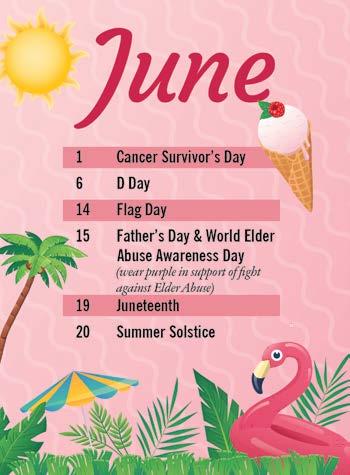

HOW CAN DOL BILLING ASSOCIATES HELP YOUR BUSINESS?
Anne Ellis BSN RN Owner/CEO CFO a.ellis@dolbilling.net
Phone: 618-294-6591
Stacy Greer RN Owner/COO s.greer@dolbilling.net
Phone: 270-216-2968
May 6: Container Gardening June 3: Floral Arranging
July 1: Love Shack Farm (on-site) 697 Upshaw Lane, Lovelaceville, KY
May 31: Master Gardener Plant Sale 9:00-11:00 a.m. (Registration not required)
Unless otherwise noted, programs occur at:

McCracken
Meetings 5:00 – 6:00 p.m. Must RSVP 270-554-9520

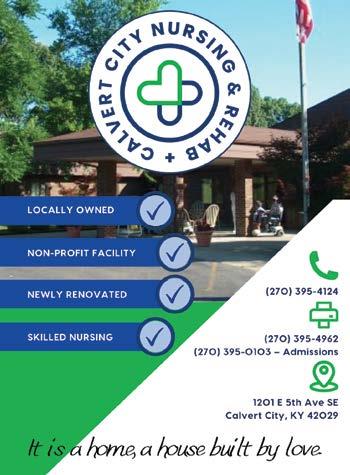

By: Carol Ullerich
Seeking a new garden experience? Check out a dozen botanical gardens and arboreta along the newly established Kentucky Garden Trail. This article introduces you to the westernmost participant, The Doran Arboretum, 300 Hickory Drive, in Murray, Kentucky. According to Trip Advisor, The Doran Arboretum has been voted Murray’s number one place to visit, welcoming 200 to 300 guests daily, and hosting one to five events monthly.
The Kentucky Garden Trail spans Murray to Lexington. To take part, grab a free Passport Journal at any Trail Garden, including The Doran Arboretum, and begin garden hopping, collecting a stamp at each site. Acquire six stamps, have a garden staffer sign the Garden Reward Form, and receive a gift. Collect all twelve stamps, have a garden staffer sign the reward form, and receive a Grand Prize.
Kim Hydes, Director of Oldham County Tourism, approached eight other tourism offices around Kentucky hoping at least five would join her in applying for an ARPA grant requiring a minimum of five participating communities. The idea was to create an official garden trail promoting Kentucky’s often hidden gems—botanical gardens and arboreta—tucked off the beaten path, and the communities in which they are located, with main goals of constant bloom, community promotion and garden education. In addition to Crestwood and Goshen in Oldham County, the trail winds through Frankfort, Louisville, Lexington, Murray, Owensboro, Hopkinsville, Clermont in Bullitt County and Bowling Green, including four university campuses. While not a state initiative, the Kentucky logo appears on all program literature because, as Hydes noted, each office signing the application proudly represents Kentucky tourism. https://kentuckygardentrail.com.
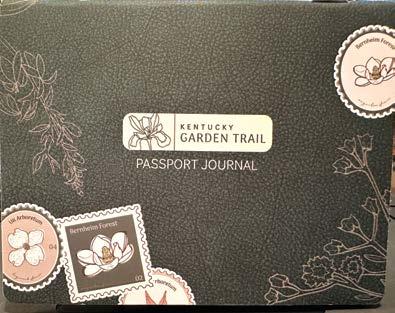
Established in 2013 as The Arboretum at Murray State University, now known as The Doran Arboretum, it is located less than two blocks from the main campus. It occupies approximately 13 acres of the 44acre Pullen Farm. The arboretum is open daily dawn to dusk with no admission fee. It features a 0.8-mile concrete walking trail lined with annuals, perennials, shrubs and trees. It’s an inviting space for strolling, jogging, or walking a leashed dog.
Additional features include a sensory garden, community garden plots, a rain garden, butterfly and pollinator gardens, a private pergola overlooking a large water feature, a bee apiary with viewing windows, play pockets for children, and a diverse collection of native and cultivated landscape plants—all set against a relaxed country farm backdrop.
The project launched in October 2024 with a dozen sites spread across the Commonwealth. In October 2025, the original nine CVBs will reevaluate the TRAIL and calculate the “pay to play” cost to join once a garden or arboretum meets specific criteria to maintain quality standards.
The bucolic setting is bordered by Murray High School, farmland and quiet homes. The arboretum offers manicured venues, with large and small pavilions for weddings, outdoor parties, showers and receptions, and plenty of scenes for photo shoots.

At its roots, the arboretum is an educational display garden providing real-world, hands-on experience to students. While private donations are accepted, the arboretum is primarily supported by the Murray State University Hutson School of Agriculture. A 12-member board of volunteers advises the arboretum which has only two full-time employees: Dava Hayden, Instructor/Arboretum Manager, and Jonah Brannon, Instructor/Assistant Arboretum Manager, both with the Hutson School of Agriculture. Student workers and volunteers provide essential support, serving as the hands and feet of the arboretum.
Board members support the arboretum by raising funds for development of the property and advising on expansion projects. Many board members also volunteer their time in a wide range of activities like creating newsletters, organizing events, maintaining gardens, and managing The Friends of the Arboretum program.
Dedicated to cultivating a community of lifelong learners, the arboretum offers opportunities for enrolled horticulture and agriculture students, and the public, to explore, study and embrace conservation and stewardship principles. Volunteers play a crucial role and are trained alongside employees and students before taking on independent garden tasks. Help is especially needed during summer break when students are not on campus.
One indispensable community volunteer at the arboretum is Joe Snow. He’s particularly passionate about mason bees—so-called because they use mud, resembling “masonry,” to form nests. Also known as leafcutter bees, male mason bees have no stinger. While females can sting, they do so only when handled roughly or trapped under clothing. Plus, their sting is mild. Mason bees are solitary, nonaggressive, and in Snow’s estimation—severely underrated. He deems them more valuable pollinators than honeybees. Why? According to Oregon State University, extension.oregonstate.edu, orchard mason bees emerge before honeybees each spring, and transfer more pollen across a wider variety of flowers.
To raise awareness of mason bees, Snow is building wooden beehouses to support their survival—an effort critical to maintaining a healthy ecosystem in Western Kentucky. These mason beehouses will be available for purchase during The Doran Arboretum’s Earth Day Celebration and Plant Sale on April 26.
In January-February 2025, Horticulture students competed in The Southern Association of Agricultural Scientists Conference in Irving, Texas. For the sixth consecutive year, the Murray State University team took first place overall in Hort judging, plant ID and club share presentation. The four-woman team—three freshmen and a junior (Corrin Heilig, Kaitlynn Burruss, Shelby Barber and Allie McCarty)— earned first place in Woody Ornamental ID; Fruit Crop Commodities Judging; and Vegetable Crop Commodities Judging; along with second place in Floriculture Crop Commodities Judging. The team is advised by Hayden who lauded the women for correctly identifying numerous plants from U.S. Hardiness Zones 8 and 9 (mild temps with no freezing weather) rarely seen in Murray. Their success is critical because they will soon lead the horticulture industry. Team members also won individual awards. Shelby Barber led my tour of the arboretum; I was most impressed.
In 1995, Mabel Pullen gifted the 44-acre farm to the Hutson School of Agriculture with the intention of the farm remaining an education laboratory for agricultural students. On September 11, 2023, the arboretum was renamed The Doran Arboretum after receiving a very generous gift to establish an endowment from The Doran Foundation.
Funds for the arboretum are raised by donations; rentals for weddings, parties, and meetings; plus, the sale of Friends of the Arboretum memberships. A Friends of the Arboretum membership runs annually
from July 1-June 30. A general membership costs $35.00. It includes various perks with the most desired being early entrance to multiple plant sales each year. The Horticulture Club Spring Plant Sale for members is April 16-17. The general public must wait until April 26.
To stay up to date on events and changes at the Doran Arboretum, follow on social media at facebook.com/MSUArboretum or Instagram @thearboretum msu. If you would like to support the Arboretum by becoming a friend or through a larger donation, contact Abby Hensley, Director of Development, 270-809-3131 or ahensley2@ murraystate.edu.
The Arboretum offers a mix of native species and introductions new to Calloway County. Trees, shrubs and flowers historically significant to Western Kentucky are abundant throughout the Open Woodlands; Savanna; Sensory Garden; Oak/Hickory Forest; and Wetlands. More information available at facebook.com@MSUArboretum.
Stanley and Mabel Pullen were deeply rooted in Murray, KY. Mr. Pullen established Agriculture at Murray State University and served as its first full-time Agriculture teacher and Agriculture Department Chair. A one-time County Agriculture agent, he introduced Boy Scouting to Calloway County. Mrs. Pullen taught Agriculture and worked in other campus offices. The Pullens purchased 44 acres in two tracts in the 1920’s. Agriculture students were hired to run the farm and the dairy known as College Crest Farm—the first in Kentucky to sell Grade A milk.
After Mr. Pullen’s sudden death in 1935, his widow continued relying on student workers to keep the farm going, housing them onsite. When Mrs. Pullen passed, she willed the farm and much of her estate to the Murray State University Foundation for Agriculture Department scholarships and needs.
Life was not all roses for the Pullens. The farm could easily have been lost after Mr. Pullen’s death due to two overdrawn bank accounts he had opened. To pay off a mortgage, Mrs. Pullen taught in local schools, pinched pennies, and occasionally sold eggs and vegetables.
Hear Mrs. Pullen describe—in her own words—her life before, with and after her husband’s death. Highlights: As a child, Mrs. Pullen became separated from her mother in Grand Central Station; at times the Pullens feasted, other times they were near famine; Mrs. Pullen attended Eastern Kentucky University, Berea, Vanderbilt and Murray State University. You’ll hear her impressions of the flu epidemic of 1918-19; the Great Depression when all banks closed in 1929; working 19 months at the Detroit Packard factory building airplane and marine engines during WWII; Mr. Pullen bringing home a dozen chickens after judging a county fair in Tennessee; and, their daughter, Mary, graduating a year after her father’s death.
Mrs. Pullen retired from teaching at age 71 with 23 years of classroom experience; she said her best investment was a $30 washing machine—“a luxury”—she paid off $5.00 at a time; and the two most important things she did for herself were applying for a Social Security number and getting a library card (the first book she read was by Kentucky author Jesse Stuart). Access the recorded interview at: https://oralhistory.eku.edu/items/show/74.
To learn more about the arboretum or to support it through the Friends of the Arboretum program, visit facebook.com@MSUArboretum.

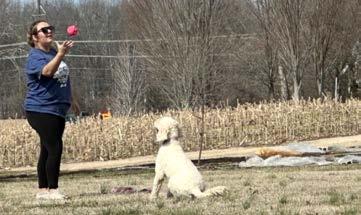


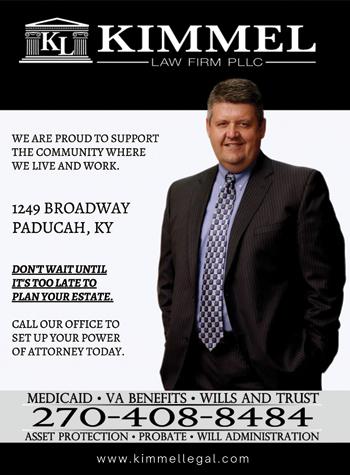

By: Carol Ullerich
This article does not constitute legal advice. If you believe you are witnessing, or have witnessed, elder abuse—contact 9-1-1. If you suspect elder abuse is ongoing or has occurred in Kentucky, contact the Cabinet for Health and Family Services, Adult Protective Service. If you need a will, advance directive, or advice on planning your estate, contact an attorney familiar with wills and estates.
This June, Elder Abuse will be in the news and purple will be the color of the month. Since 2011, June 15 has been designated by the United Nations’ General Assembly as World Elder Abuse Awareness Day (WEAAD). Rather than simply noting the day on the calendar and moving on, this article explores “Elder Abuse” and why it deserves worldwide attention.
Age is relevant to everyone. Either we are, hope to be, or know someone who is, sixty years or older. According to the Centers for Disease Control and Prevention (CDC), on one’s 60th birthday, he/she legally becomes an “older adult/ elder.” That’s true in Kentucky, but Tennessee Code 39-15510, defines an “elderly” person as one 70 years or older. At least one quarter of Kentucky’s population is currently over 65, and it’s predicted the number of Kentuckians “85+” will double before 2029.
Older Americans appear to be growing at a faster clip than younger ones, but that may be an illusion. Reports of nonfatal injuries are limited to seniors treated in emergency rooms— omitting data from non-ER treating providers—and there are no numbers for those who don’t seek treatment. Then there’s the infinite number of cases never reported to police, friends or family, because the senior is fearful or unable to describe the event.
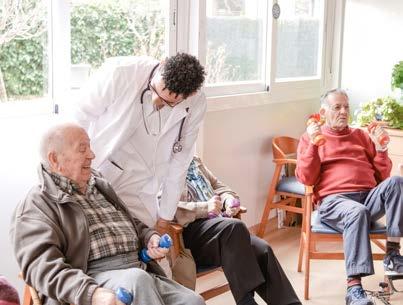
a risk of harm to an older adult. Abuse often occurs at the hands of a caregiver or person the elder trusts. Every state has some form of elder abuse prevention law and definitions.
Between 2002 and 2016, more than 643,000 seniors were treated in ER’s for nonfatal assaults. More than 19,000 homicides occurred in the same time frame. During the period studied, the rate for nonfatal assaults against men grew by more than 75%, but just 35% for women. Between 2010 and 2016, the homicide rate for men rose 7%; no increase was reported for women.
The financial cost of violent injuries to seniors is significant. In 2022, the US spent $33 billion just responding to violent injuries against folks 60 and older. Between 2015 and 2022, nonfatal assaults increased by 31% while the homicide rate rose by 26%.
WHAT CONSTITUTES “ELDER ABUSE?” The CDC defines the term as “an intentional act or failure to act that causes or creates
REPORTS OF ELDER ABUSE DOUBLED DURING COVID. Before COVID, the National Institutes of Health reflected one in ten older people reported elder abuse. Surveys conducted in April and May 2020, (during mandatory COVID lockdown), showed one in five older adults reported an incidence of elder abuse—an increase of 83.6%. Another study estimates just one in 24 instances of elder abuse is reported to authorities. Storey, J. E., Risk Factors for Elder Abuse and Neglect: A review of the Literature. Aggression and Violent Behavior. January-February 2020. Found on internet at https://www. sciencedirect.com/science/article/abs/pii/S1359178918303471
ENTITLEMENT TO DIGNITY AND SECURITY
Most of us would agree “senior adults deserve dignity and security.” Some seniors enjoy neither due to “elder abuse” which, for some,
tragically ends in death. Elderly people are often abused by caregivers and those they trust including family members, friends, peers, loved ones and service providers. But, an abuser may just as easily be a stranger. Abusers come in all ages, shapes, races, colors, religions, nationalities and sizes. They can be billionaires or paupers; wellemployed or jobless.
They inflict abuse by hurling threats, insults and harsh commands, or ignore the senior, treating him/her like a child. An abuser needn’t physically overpower the senior, but may lash out due to his/her own frailty, loneliness, depression, physical disability, or mental illness. An abuser may also seek to harm a senior physically, emotionally, mentally, emotionally, as well as through neglect or financial exploitation.
To be blunt, there is no typical abuser. But there may be common signs of trouble: watch for use/abuse of drugs or alcohol; being highly stressed or depressed; lacking a social network, and training or experience in caring for the senior population; and, being emotionally or financially dependent on older people. Common examples of elder abuse include:
PHYSICAL ABUSE – intentional or reckless use of physical harm or physical coercion that may cause bodily injury, physical pain, or impairment. Examples: hitting, beating, pushing, shaking, slapping, kicking, pinching and/or burning; also, unlawful, excessive or unnecessary use of force such as restraints, over- and under-medicating, and force-feeding. Physical evidence may include: bruises, pressure marks, broken bones, abrasions, and burns.
SEXUAL ABUSE – non-consensual sexual contact of any kind with an older adult. Examples: Unwanted touching, sexual assaults or battery, sexual harassment, sexual interaction with elders lacking capacity to consent, fondling, intercourse, or any other sexual activity with an older adult who is unable to understand, unwilling to consent, threatened, or physically forced.
EMOTIONAL/PSYCHOLOGICAL ABUSE – Infliction of anguish, pain or distress through verbal or nonverbal acts. Examples: verbal assaults, insults, threats, intimidation, humiliation, isolation and harassment. Look for: belittling, threats, or other uses of power and control by individuals.
NEGLECT – Refusal or failure of caregiver or fiduciary to fulfill any part of obligations or duties of care to older person. Elder Justice Act defines neglect as “failure of a caregiver or fiduciary to provide goods or services necessary to maintain health or safety of elder.” Examples: failing to provide for life necessities such as food, water, clothing, shelter and medicine. Warning signs: Bedsores, unattended medical needs, poor hygiene, and unusual weight loss.
FINANCIAL – Illegal, unauthorized or improper use of older person’s resources for monetary or personal benefit, profit or gain depriving older person of rightful access to, or use of, benefits, resources, belongings or assets. Examples: misusing or stealing older person’s money or possessions; *Coercing or deceiving older person into signing any document such as contract or will; improper use of conservatorship, guardianship or power of attorney.” Look for sudden changes in financial situations.
SELF-NEGLECT – Adult’s inability, due to physical or mental impairment or diminished capacity, to perform essential self-care tasks. Examples: includes obtaining adequate food, water, clothing, shelter, personal hygiene, medical and mental health care and safety precautions, and/or managing one’s finances. Excludes mentally
competent older person, understanding consequences of decisions, making conscious and voluntary decision to engage in acts threatening health or safety as matter of personal choice.
ABANDONMENT – Desertion of older person by individual who has assumed responsibility for providing care for elder, or by person with physical custody of elder. Some state statutes classify abandonment as separate and unique form of elder abuse; others classify elder abandonment as type of elder neglect. Abandonment may occur at hospital, nursing home, or other public place. Check state statute.
CONFINEMENT – Restraining or isolating older adult, other than for medical reasons.
PASSIVE NEGLECT – Caregiver’s failure to provide older adult with life’s necessities, including, but not limited to food, clothing, shelter, or medical care.
WILLFUL DEPRIVATION – Denying older adult shelter, medication, medical care, food, therapeutic device or other physical assistance, and exposing person to risk of physical, mental, or emotional harm—except when older, competent adult has expressed desire to forego such care.
FINANCIAL EXPLOITATION – Misuse or withholding of older adult’s resources by another.
A sobering thought: Survivors of elder abuse report higher rates of depression and social withdrawal, increased hospitalization, and even premature death. ncoa.org.
PROTECT YOURSELF AS YOU AGE:
Plan your future by securing a power of attorney and living will; seek advice before signing documents, especially legal papers; stay active and engaged in the community; don’t isolate yourself from friends and family; don’t be afraid to talk with friends about things you’ve noticed or experienced—ask if what you’re seeing is unique or common among your close circle of friends; handle your own mail (both opening and posting); don’t share personal info over the phone and never with strangers; have checks direct deposited; have your own phone; review and update your will occasionally; and know your rights, especially if you pay a caregiver or live in a nursing home.
To protect yourself from becoming a victim of the “grandparent scam,” create a code word with each grandchild; if one of them calls with an unusual financial request—perhaps needing bail money immediately—ask for the code word. If it isn’t automatically provided, it’s a scam—hang up! Criminals today grab a snippet of a person’s voice and through artificial intelligence (AI) create a script using your grandchild’s voice to trick sympathetic seniors into parting with their money. Don’t fall for this trick! Instead, make certain your grandchild is okay, by calling the child or his parent. If you need more convincing, watch the movie Thelma!
These sites may help you find more info about recognizing and reporting elder abuse: Elder Abuse: A public health issue that affects all of us | ACL Administration for Community Living; Elder abuse: How to spot warning signs, get help, and report mistreatment; How to Report a Nursing Home | Abuse Warning Signs & Hotlines; This Is Elder Abuse: Types, Warning Signs, and How to Report It
By: Carol Ullerich
On seeing the letters “ALF,” sometimes short for Alien Life Form, you may have thought about an odd-looking, loud-mouthed, furry alien who crashed into an American family’s garage and tried to hide from Earthlings on a 1980’s TV show. That ALF is NOT the focus of this article, but you can watch reruns on YouTube.
This article is about a far more serious topic. Are you thinking about changing your surroundings? I’m not suggesting a new coat of paint or installing a walk-in tub. I’m proposing a brand-new address—one free of stairs that offers food service, games, new friends, activities and even transportation.
The “ALF” I’m referencing is short for assisted living facility. These communities bridge the gap between independent living in your own home, and full-time skilled care in a nursing home. It’s still a fairly novel creation but one with which you should familiarize yourself before it’s needed. And it may be more economical than you think. Read on to learn if ALF may be a good fit for you or a loved one—now, or in the future.
The very first ALF, named “The Residence,” opened in 1981 in Portland, Oregon. The brainchild of Dr. Keren Brown Wilson, it offered long-term private living quarters in a secure atmosphere, with staff available to assist with aspects of daily living customized to each individual resident. All residents, regardless of mobility, maintained their independence and dignity. The History of Assisted Living, genseniorliving.com.
Popularity of the ALF approach caught on and quickly spread across the US. The concept continues evolving to meet changing senior needs. Some properties now offer specialized units for those with dementia and cognitive impairments; some allow pets. With the senior population growing, demand for ALF’s must keep up. By 2030, just five years from today, it’s estimated more than 8 million seniors will live in ALF’s. Not surprisingly, California, Texas and Florida have the most ALF’s.
Cost of living in an ALF is typically billed by the month. Many communities offer tiered pricing, allowing those requiring fewer services to pay less.
Forms of assisted living date to the 17th century with almshouses for the homeless and elderly funded by charitable groups. Then came poor houses supported by churches and nonprofits. After the Great Depression, nonprofit old age homes emerged—still based on charity, they led to creation of the assisted living industry. Medicare and Medicaid were introduced in 1965.
• What services are offered: if you want an onsite salon or barber, and someone to give you a pedicure, ask whether those services are available and the cost. Get a price list and study floor plans. What’s included in the quoted monthly price and what costs extra? Is the size room you need realistically within your budget?
• Get a floor plan specifying room dimensions. Will your furniture fit in the space you are considering, or must you budget for new furniture and delivery?
• Are monthly cable and internet included or extra?
• Have a meal. Is the food to your liking? Do you see anyone you know in the dining room? Do residents seem happy and talkative? If you customarily take a daily walk, is there a safe place to take a leisurely stroll. If you plan to bring a car, will you have a designated parking spot? If you won’t be bringing a car, can you shop nearby? Taxis can be costly. Can you safely walk to a grocery? Is there a convenient bus? How will you reach a pharmacy or doctor appointments? Is the ALF able to take you to medical appointments and is there a charge for the service?
• Ask about staff longevity—is it a revolving door or are workers mostly long-term employees?
• Are there plans to enlarge or add new services?
Make a list of what you envision in your new home and distinguish items that would be “nice” from “dealbreakers” you need to be content? Some ALF’s are high-rises with elevators, others are sprawling groundlevel campuses resembling a country club. If you choose a high-rise and the elevator fails, can you manage stairs? Is there an alternate way of reaching your apartment?
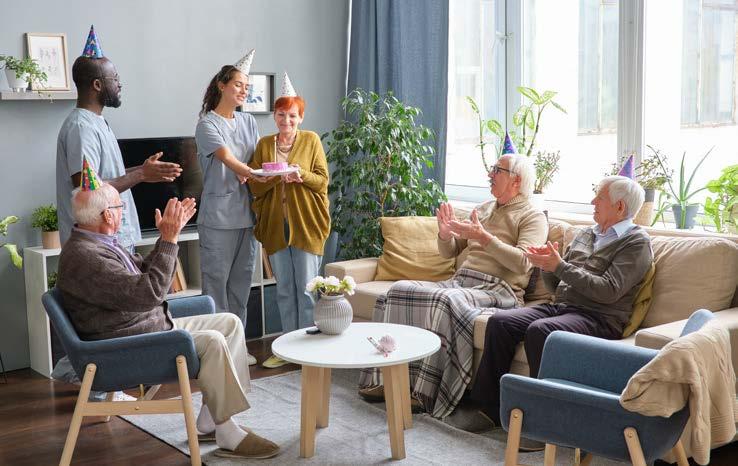
With your list in hand, visit several ALF’s to determine what’s available and what you do and do not like. Be honest: can you realistically afford all the items on your list?
Seek recommendations from friends who have already made the move to an ALF. Are they happy with their choice? Is there something they would change or a particular question they would ask based on their experience? Visit more than once and at different times of day. Be honest with yourself. If a daily bridge game is important to you, ask if any residents play bridge. Learn when they play and visit at that time to observe a few hands. If there are no foursomes, are you willing to teach others to play to create one?
Keep in mind, one ALF may not have everything you want. Be forward-thinking. Visit several ALF’s to determine where you’ll be happiest. Take notes.
Additionally, ALF’s are popular, and available rooms may be hard to find. Begin your search well in advance of your desired move so you do not have to make a hasty choice or have no choice to make. Don’t be shocked if you’re invited to place your name on a waiting list. SeniorAdvisor.com (September 2017).
A few generalizations: Seniors living in ALF’s usually have a private apartment with shared services including meals, social and recreational activities, and varying levels of therapeutic and medical assistance. If you wish to dine in your room, ask whether your meal can be delivered to your room at no additional charge. Residents are generally satisfied with the lifestyle afforded by their chosen community. There’s no list of amenities an ALF must provide; they answer to state licensing authorities—ask the state what must be provided.
As with any product or service you’d consider buying, ask each provider you are considering what is included in the basic monthly fee and what services are available at an extra cost. Ask up front to avoid surprises.
You may also inquire about a facility’s “continuum of care,” referring to a range of care provided by a single senior community from independent living at one end of the spectrum to 24-hour skilled nursing care at the other end. This would be particularly important for a married couple with different health needs or a single senior seeking to receive increasing services without moving as he/she ages, and a current or anticipated condition progresses.
The price tag of living at an ALF may seem high but consider all the individual expenses you pay at your private home that will now be provided by the ALF. The individual cost of buying and preparing food; utilities; grounds and building maintenance; plus, round-theclock security staff. The cost of each of those items can rise quickly. In an ALF, you share those costs with other residents rather than alone.
The Numbers. Genworth estimated the median average cost for assisted living in the US in 2016 was $43,539 annually. Genworth’s 2016 Cost of Care Survey. The Genworth figure for 2025 is $66,110 annually. How Much Does Assisted Living Cost in 2025?
What many find surprising is the cost of assisted living in the US is often lower than combined expenses of living at home using in-home care services. Genworth predicts the annual cost for in-home care in 2025 will be $72,820 for homemaker services and $80,102 for home health aide services. In contrast, the median assisted living cost will be about $68,110 in 2025. “In light of those numbers, opting for an assisted living community could save you over $4,000 yearly!”
LIFE CARE CENTER AT LA CENTER
Skilled Nursing Rehabilitation (270) 665-5681
252 W. Fifth St., La Center, KY 42056
Pricing: Call for pricing
Ways to Pay: Medicare, Medicaid, PP, Insurance
PRINCETON NURSING & REHAB
Skilled Nursing Rehabilitation (270) 365-3541
1333 W. Main St., Princeton, KY 42445
Pricing: $190 per day or $5700 per month
Ways to Pay: Medicare, Medicaid, PP, or CI.
BROOKDALE MURRAY
Assisted Living (270) 759-1555
905 Glendale Rd., Murray, KY 42071
Pricing: $3395-4500/month
Ways to Pay: PP, VA, & LTC Ins.
HICKORY WOODS SENIOR LIVING
Assisted Living (270) 759-8700
84 Utterback Rd., Murray, KY 42071
Pricing: $3930-5515/ month
Ways to Pay: PP, VA, & LTC Ins.
SPRING CREEK HEALTHCARE
Skilled Nursing Rehabilitation (270) 752-2900
1401 S. 16th St., Murray, KY 42071
Pricing: $195/shared, $215/Private
Ways to Pay: Medicare, Medicaid, PP, or CI.
COUNTRYSIDE CENTER FOR REHAB AND NURSING
Skilled Nursing Rehabilitation (270) 628-5424
47 Margo Ave., Bardwell, KY 42023
Pricing: Call for pricing
Ways to Pay: Medicare, Medicaid, PP, or CI.
CRITTENDEN COUNTY HEALTH & REHABILITATION CENTER
Skilled Nursing Rehabilitation (270) 965-2218
201 Watson St., Marion, KY 42064
Pricing: Call for pricing
Ways to Pay: Medicare Medicaid, PP, or CI.
FULTON NURSING AND REHAB
Skilled Nursing Rehabilitation (270) 472-1971
1004 Holiday Ln., Fulton, KY 42041
Pricing: Call for pricing
Ways to Pay: Medicare, Medicaid, PP or CI.
GREEN ACRES HEALTHCARE
Skilled Nursing Rehabilitation (270) 247-6477
402 W. Farthing St., Mayfield, KY 42066
Pricing: Private $258 day, Semi $233 day
Ways to Pay: Medicare, Medicaid, PP, or CI
MILLS HEALTH AND REHAB
Skilled Nursing Rehabilitation (270) 247-7890
500 Beck Ln., Mayfield, KY 42066
Pricing: $233 day
Ways to Pay: Medicare, Medicaid, PP, or CI.
BUNGALOWS AT MAYFIELD
Assisted Living (270) 251-0233
1517 W. Broadway, Mayfield, KY 42066
Pricing: Starting at $2,935
Ways to Pay: PP, VA, & LTC Ins.
CLINTON PLACE
Skilled Nursing Rehabilitation (270) 653-5558
106 Padgett Dr., Clinton, KY 42031
Pricing: Shared $216, Private $240
Ways to Pay: Medicare, Medicaid, PP, or CI.
SALEM SPRINGLAKE HEALTH AND REHAB
Skilled Nursing Rehabilitation (270) 988-4572
509 N. Hayden Ave., Salem KY 42078
Pricing: Call for Pricing
Ways to Pay: Medicare, Medicaid, PP, or CI.
LANDMARK OF KUTTAWA
Skilled Nursing Rehabilitation (270) 388-2291
1253 Lake Barkley Dr., Kuttawa, KY 42055
Pricing: $196/day short term or $5,900/mo
Ways to Pay: Medicare, Medicaid, PP, SI
Independent Living Assisted Living Skilled Nursing Rehabilitation (270) 388-2868
300 Beech St., Kuttawa, KY 42055
Pricing: Call for pricing
Ways to Pay: Medicare, Medicaid, PP, SI, VA
LAKE WAY NURSING AND REHAB
Skilled Nursing Rehabilitation (270) 527-3296
2607 Main St., Benton, KY 42025
Pricing: Call for pricing
Ways to Pay: Medicare, Medicaid, PP, SI
THE STILLEY HOUSE SENIOR LIVING
Assisted Living Independent Living (270) 527-1700
971 Birch St., Benton, KY 42025
Pricing: Call for Pricing
Ways to Pay: PP, VA, & LTC Ins.
CONVALESCENT CENTER
Skilled Nursing Rehabilitation (270) 395-4124
1201 E. 5th Ave., Calvert City, KY 42029
Pricing: Call for pricing
Ways to Pay: Medicare, Medicaid, PP, SI
OAKVIEW NURSING AND REHAB
Skilled Nursing Rehabilitation (270) 898-6288
10456 U.S Hwy 62, Calvert City, KY 42029
Pricing: Call for pricing
Ways to Pay: Medicare, Medicaid, PP, SI,
CHARTER SENIOR LIVING
Personal Care
Memory Care (270) 297-4301
2747 West Park Drive* Paducah, KY 42001
New building is being built, address will change.
GAITHER SUITES AT WEST PARK
Assisted Living Personal Care Hospice Therapy (270) 442-3999
4960 Village Square Dr., Paducah, KY 42001
Pricing: Call for Pricing
Ways to Pay: PP, VA, & LTC Ins.
HOLIDAY JACKSON OAKS
Independent Living (270) 554-8122
2500 Marshall Ave., Paducah, KY 42003
Pricing: Starting at $2,109
Ways to Pay: PP
NURSING & REHABILITATION CENTER
Skilled Nursing Rehabilitation Respite Care
Palliative Care Hospice (270) 443-6543
544 Lone Oak Rd., Paducah, KY 42003
Pricing: Call for pricing Ways to Pay: Medicare, Medicaid, PP, SI,
Skilled Nursing Rehabilitation Respite Care
Palliative Care Hospice (270) 442-6884
100 Marshall Ct., Paducah, KY 42001
Pricing: Call for pricing Ways to Pay: Medicare, Medicaid, PP, SI
Assisted Living (270) 554-6911
2121 New Holt Rd., Paducah, KY 42001
Pricing: Call for pricing Ways to Pay: PP, VA, & LTC Ins.
HAVEN NURSING AND REHAB
Skilled Nursing Rehabilitation (270) 442-6168
867 McGuire Ave., Paducah, KY 42001
Pricing: $272/day Ways to Pay: Medicare, Medicaid, PP, SI
STONECREEK HEALTH AND REHAB
Skilled Nursing Rehabilitation (270) 444-9661
4747 Alben Barkley Dr., Paducah, KY 42001
Pricing: Call for pricing Ways to Pay: Medicare, Medic- aid, PP, SI
Assisted Living Independent Living (270) 366-0408
2265 Olivet Church Rd., Paducah, KY 42001
Pricing: Call for pricing Ways to Pay: PP, VA, & LTC Ins.
Assisted Living Memory Care (270) 534-9173
1700 Elmdale Rd., Paducah, KY 42003
Pricing: Starting at $3,420
Ways to Pay: PP, VA, & Memory Care
BARKLEY PLANTATION
Assisted Living (270) 522-0018
640 Bypass Rd, Cadiz, KY 42211
Pricing: Starting at $3,355
Ways to Pay: PP, VA, & LTC Ins.
(270) 522-3711
66 Shelby St., Cadiz, KY 42211
Pricing: Starting at $3,483
Ways to Pay: VA, Medicare, Medicaid
SHADY LAWN NURSING AND REHABILITATION
Skilled Nursing Rehabilitation (270) 522-3236
2582 Cerulean Rd, Cadiz, KY 42211
Pricing: Starting at $6,798
Ways to Pay: Medicare, Medicaid, PP, SI
METROPOLIS REHAB AND HEALTH CENTER
Skilled Nursing Rehabilitation (618) 524-2634
2299 Metropolis St., Metropolis, IL 62960
Pricing: starting at $4,779
Ways to Pay: Medicare, Medic- aid, PP, SI
MISTY MEADOWS SENIOR LIVING
Independent Living (618) 524-1818
2550 Devers Rd., Metropolis, IL 62960
Pricing: Starting at $1,975
Ways to Pay: PP
SOUTHGATE NURSING AND REHAB
Skilled Nursing Rehabilitation (618) 524-2683
900 E 9th St., Metropolis, IL 62960
Pricing: Call for pricing
Ways to Pay: Medicare, Medicaid, VA., PP, SI
SOUTHGATE SENIOR LIVING
Independent Living (618) 524-6868
1421 W. 10th St., Metropolis, IL 62960
Pricing: Call for pricing
Ways to Pay: PP
AHC UNION CITY
Skilled Nursing Rehabilitation (731) 885-8095
1630 E. Reelfoot Ave., Union City,TN 38261
Pricing: Call for pricing
Ways to Pay: Medicare, Medicaid, PP, SI
HOUSE SENIOR LIVING
Assisted Living (731) 389-5024
701 Sherrill St., Union City,TN 38261
Pricing: Call for pricing
Ways to Pay: PP, VA, LTC Ins., TennCare “Choices”
Assisted Living (731) 885-8004
1620 N. Clover St., Union City,TN 38261
Pricing: $125/day for shortterm care; $2,900-$3,500/ month for long-term care
Ways to Pay: PP, VA, pay, LTC Ins., TennCare “Choices”
Skilled Nursing Rehabilitation (731) 885-9065
1084 County Home Rd., Union City,TN 38261
Pricing: Call for pricing
Ways to Pay: Medicare, Medicaid,PP, SI
Skilled Nursing Rehabilitation (731) 885-6400
1105 S. Sunswept St., Union City, KY 38261
Pricing: Call for pricing
Ways to Pay: Medicare, Medicaid, PP, SI,
Skilled Nursing Rehabilitation (731) 587-3193
431 Hanings Ln., Mar tin, TN 38237
Pricing: Call for pricing
Ways to Pay: Medicare, Medicaid, PP, SI,
Skilled Nursing Rehabilitation (731) 587-0503
158 Mount Pelia Rd., Martin, TN 38237
Pricing: Call for pricing
Ways to Pay: Medicare, Medicaid, PP, SI,
Assisted Living (731) 213-3157
436 Hannings Ln., Martin, TN 38237
Pricing: Call for pricing
Ways to Pay: PP
Skilled Nursing Rehabilitation (731) 364-2450
897 Evergreen St., Dresden,TN 38225
Pricing: Call for pricing
Ways to Pay: Medicare, PP, PI, CI, Medicaid
Skilled Nursing Rehabilitation
Long Term Care (731) 364-3158
700 WC Nursing Home Rd., Dresden,TN 38225
Ways to Pay: Medicare, PP, Medicaid
BALLARD CO.
See surrounding counties.
CALDWELL CO.
CALDWELL COUNTY HOSPITAL HOME HEALTH AGENCY
(270) 365-2011
1310 US-62, Princeton, KY 42445
Medicare & Private Ins
CALLOWAY CO.
INTREPID USA HEALTHCARE SERVICES
(270) 753-1434
1616 Hwy 121 Bypass, Ste C, Murray, KY 42071
Medicare, Veteran’s Benefits, Private Ins, and Medicaid
CARLISLE CO.
See surrounding counties.
FULTON CO.
LIFELINE HEALTH CARE OF FULTON (270) 472-2294
309 Main St, Fulton, KY 42041
Medicare, Private Ins
GRAVES CO.
INTREPID USA HEALTHCARE (800) 437-2001
1025 Paducah Rd Suite A, Mayfield, KY 42066
Payment Medicare, Veteran’s Benefits, Private Ins.
LIFELINE OF JACKSON PURCHASE HOME HEALTH (270) 753-5656
1011 Paris Rd #345, Mayfield, KY 42066
Medicare Advantage Plans
MERCY HEALTH HOMECARE & MERCY HEALTH HOSPICE (270) 415-3636
305 Wyatt Drive, Suite B Mayfield, KY 42053
Services are listed by county to show what services are closest to your location. If you do not see an office in your county, then search surrounding counties. Most businesses serve a large area.
HomeCare & Hospice
Payor Sources: all payor sources including Medicare, Medicaid and Private Insurances
LIVINGSTON CO.
See surrounding counties.
LYON CO.
See surrounding counties.
MARSHALL CO.
MARSHALL COUNTY HOSPITAL
HOME HEALTH
(270) 527-8084
673 Old Symsonia Rd, Benton, KY 42025
Medicare Replacement Insurance *No Private Insurance
MCCRACKEN CO.
BAPTIST HEALTH HOME CARE (270) 575-2990
220 Lone Oak Rd, Paducah, KY 42001
Medicaid, Medicare & Private Ins
BRIGHTMORE HOME CARE OF KENTUCKY UNITED ENERGY WORKERS HEALTHCARE (270) 709-3145
3565 Lone Oak Rd, Suite 4 Paducah, KY 42001
Type: Medical free Services for EEOICPA and RECA beneficiaries. (Energy Employees Occupational Illness Compensation Program Act and Radiation Exposure Compensation Act)
MERCY HEALTHHOME CARE AND HOSPICE (270) 415-3600
225 Medical Center Dr # 203, Paducah, KY 42003
HomeCare & Hospice
Payor Sources: all payor sources including Medicare, Medicaid and Private Insurance
SUPPORTIVE CARE OUTPATIENT (SCOP)
Provider visits in the home setting (270) 415-6100
25 Medical Center Drive, Suite 203 Paducah, KY 42003
SCOP Payor Sources: all payor sources including private insurance, Medicare and Medicaid
CARETENDERS HOME HEALTH
(270) 522-0488
72 Lone Oak Dr, Cadiz, KY 42211
Medicare & Private Ins
LIFELINE HEALTH CARE OF WESTERN KY (270) 885-6353
210 Burley Ave # A, Hopkinsville, KY 42240
Medicare & Private Ins
BAPTIST HEALTH HOME CARE METROPOLIS (618) 524-3661
1003 East Fifth Street, Metropolis, IL 62960
Medicare and Private Ins
MERCY HEALTH HOMECARE & MERCY HEALTH HOSPICE (270) 415-3600
704 East Fifth Street, Metropolis, IL 62960
HomeCare & Hospice
Payor Sources: all payor sources including Medicare,Medicaid and Private Insurances
ADORATION HOME HEALTH
(731) 885-6622
1625 E Reelfoot Ave, Union City,TN 38261
Medicaid, Medicare and Private Ins
AMEDISYS HOME HEALTH CARE (731) 886-1113
1509 E. Reelfoot Ave Union City,TN 38261
Medicare & Most Private Ins.
BAPTIST HOSPICE (731) 884-8617
1201 Bishop St, Union City,TN 38261
In Baptist Memorial Hospital- Union City 3rd Floor Medicare, Medicaid, & Private Ins
EXTENDICARE HOME HEALTH OF WESTERN TENNESSEE (731) 885-0866
1720 E Reelfoot Ave #203 Union City,TN 38261
Medicare and Private Ins
VOLUNTEER HOME CARE (731) 886-0305
800 E Reelfoot Ave St. 200, Union City,TN 38261
Medicare and Private Ins
ADORATION HOME HEALTH (731) 587-2996
135 Kennedy Dr, Martin,TN 38237 Medicare and Private Ins
NHC HOMECARE MILAN (731) 686-7471 14091 S 1st St, Milan,TN 38358
** Service Obion and Weakley County
TENNESSEE QUALITY CAREHOME HEALTH
(731) 587-0072
115 Neal St Suite E & F, Martin,TN 38237
Medicare and Private Ins
BALLARD CO.
See surrounding counties.
CALDWELL CO.
See surrounding counties.
CALLOWAY CO.
A PLACE CALLED HOME (270) 753-5990
1406 N 12th Suite C Murray, KY 42071
Private Pay
BLACK PEARL HOME CARE –MURRAY (270) 557-7418
1712 KY-121, Murray KY 42071
Private Pay
CARLISLE CO.
See surrounding counties.
FULTON CO.
See surrounding counties.
HICKMAN CO.
See surrounding counties.
GRAVES CO.
See surrounding counties.
LIVINGSTON CO.
See surrounding counties.
LYON CO.
See surrounding counties.
MARSHALL CO.
See surrounding counties.
MCCRACKEN CO.
BLACK PEARL HOME CAREPADUCAH (270) 557-7418
2520 New Holt Road, Paducah, KY 42001
Price varies per client Payment LTC policies
VA KENTUCKY
MAYFIELD VA
OUTPATIENT CLINIC
1253 Paris Rd A, Mayfield, KY 42066 (270) 247-2455
MAYFIELD FIELD REP
Carol Livingston
Cell (270) 556-0474
Fax (270) 495 -0835
carol.livingston@ky.gov
PADUCAH VA
OUTPATIENT CLINIC
2620 Perkins Creek Dr, Paducah, KY 42001 (270) 444-8465
DISABLED AMERICAN VETERANS-KY ROBERT
WORDEN, SERVICE OFFICER 270-444-9808
1133 Murray Ave. Paducah, KY 42002
CAROL LIVINGSTON, SSGT. USAF
VETERAN KY DEPARTMENT OF VETERANS AFFAIRS FIELD REPRESENTATIVE II
Mayfield CBOC
(Mondays & Tuesdays)
1253 Paris Dr STE A Mayfield, KY 42066
Paducah CBOC
(Wednesdays & Thursdays)
2620 Perkins Creek Dr Paducah, KY 42001
Cell (270) 556-0474
Fax (270) 495 -0835
carol.livingston@ky.gov
ANDY G BURKART, CPCU, CLU, RICP, RHU, AAI, QRV, LLC
ALL VETERANS
Cell (920) 912-4556
Paducah, KY
All Lines Insurance & Retirement Risk Mgmt Assistance (Pro Bono)
CARING PEOPLE SERVICES (270) 575-4529
1049 Jefferson St, Paducah, KY 42001
Type: non-Medical Private Pay
GOLDEN YEARS HOME CARE (270) 564-3526
2855 Jackson St., Paducah KY 42003
HOME INSTEAD (270) 558-0301
3429 Lone Oak Rd #5b, Paducah KY 42001 Private Pay
PADUCAH NURSES REGISTRY INC (270) 554-7344
60 Lakeview Dr # 1, Paducah, KY 42001 Private Pay
SENIOR HELPERS (270) 707-2273
657 Lone Oak Rd Suite 2, Paducah, KY Private Pay
TRIGG CO.
See surrounding counties.
MASSAC CO., IL
See surrounding counties.
OBION CO., TN
A PLACE CALLED HOME (731) 407-9051
206 E Reelfoot Ave, Union City,TN 38261 Private Pay
SENIOR SOLUTIONS HOME CARE (731) 203-1660
215 Hawks Rd STE 12, Martin,TN 38237
Private Pay and VA
MARION VA MEDICAL CENTER (618) 997-5311
2401 W Main St, Marion, IL 62959
OBION COUNTY TN DEPARTMENT OF VETERANS AFFAIRS FIELD REPRESENTATIVE WALTER “WALT” W. ASHER (731) 885-2781 622 Depot Street Union City,TN 38261
WEAKLY COUNTY TN DEPARTMENT OF VETERANS AFFAIRS FIELD REPRESENTATIVE RON CHEATHAM (731) 364-5727 116 W Main St. - G-04, Dresden,TN 38225
DYERSBURG VA OUTPATIENT (731) 287-7289
Clinic 1067 Vendall Rd, Dyersburg,TN 38024
BALLARD CO.
See surrounding counties.
CALDWELL CO.
CALDWELL COUNTY HOSPITAL HOME HEALTH AGENCY
(270) 365-2011
1310 US-62, Princeton, KY 42445
Medicare & Private Ins
CALLOWAY CO.
INTREPID USA HEALTHCARE SERVICES
(270) 753-1434
1616 Hwy 121 Bypass, Ste C, Murray, KY 42071
Medicare, Veteran’s Benefits, Private Ins, and Medicaid
CARLISLE CO.
See surrounding counties.
FULTON CO.
LIFELINE HEALTH CARE OF FULTON (270) 472-2294
309 Main St, Fulton, KY 42041
Medicare, Private Ins
GRAVES CO.
INTREPID USA HEALTHCARE (800) 437-2001
1025 Paducah Rd Suite A, Mayfield, KY 42066
Payment Medicare, Veteran’s Benefits, Private Ins.
LIFELINE OF JACKSON PURCHASE HOME HEALTH (270) 753-5656
1011 Paris Rd #345, Mayfield, KY 42066
Medicare Advantage Plans
MERCY HEALTH HOMECARE & MERCY HEALTH HOSPICE (270) 415-3636
305 Wyatt Drive, Suite B Mayfield, KY 42053
Services are listed by county to show what services are closest to your location. If you do not see an office in your county, then search surrounding counties. Most businesses serve a large area.
HomeCare & Hospice
Payor Sources: all payor sources including Medicare, Medicaid and Private Insurances
LIVINGSTON CO.
See surrounding counties.
LYON CO.
See surrounding counties.
MARSHALL CO.
MARSHALL COUNTY HOSPITAL
HOME HEALTH
(270) 527-8084
673 Old Symsonia Rd, Benton, KY 42025
Medicare Replacement Insurance *No Private Insurance
BAPTIST HEALTH HOME CARE (270) 575-2990
220 Lone Oak Rd, Paducah, KY 42001
Medicaid, Medicare & Private Ins
BRIGHTMORE HOME CARE OF KENTUCKY UNITED ENERGY WORKERS HEALTHCARE (270) 709-3145
3565 Lone Oak Rd, Suite 4 Paducah, KY 42001
Type: Medical free Services for EEOICPA and RECA beneficiaries. (Energy Employees Occupational Illness Compensation Program Act and Radiation Exposure Compensation Act)
MERCY HEALTHHOME CARE AND HOSPICE (270) 415-3600
225 Medical Center Dr # 203, Paducah, KY 42003
HomeCare & Hospice
Payor Sources: all payor
sources including Medicare, Medicaid and Private Insurance
SUPPORTIVE CARE OUTPATIENT (SCOP)
Provider visits in the home setting (270) 415-6100
25 Medical Center Drive, Suite 203 Paducah, KY 42003
SCOP Payor Sources: all payor sources including private insurance, Medicare and Medicaid
CARETENDERS HOME HEALTH
(270) 522-0488
72 Lone Oak Dr, Cadiz, KY 42211
Medicare & Private Ins
LIFELINE HEALTH CARE OF WESTERN KY (270) 885-6353
210 Burley Ave # A, Hopkinsville, KY 42240
Medicare & Private Ins
BAPTIST HEALTH HOME CARE METROPOLIS (618) 524-3661
1003 East Fifth Street, Metropolis, IL 62960
Medicare and Private Ins
MERCY HEALTH HOMECARE & MERCY HEALTH HOSPICE (270) 415-3600
704 East Fifth Street, Metropolis, IL 62960
HomeCare & Hospice
Payor Sources: all payor sources including Medicare,Medicaid and Private Insurances
ADORATION HOME HEALTH
(731) 885-6622
1625 E Reelfoot Ave, Union City,TN 38261
Medicaid, Medicare and Private Ins
AMEDISYS HOME HEALTH CARE (731) 886-1113
1509 E. Reelfoot Ave Union City,TN 38261
Medicare & Most Private Ins.
BAPTIST HOSPICE (731) 884-8617
1201 Bishop St, Union City,TN 38261
In Baptist Memorial Hospital- Union City 3rd Floor Medicare, Medicaid, & Private Ins
EXTENDICARE HOME HEALTH OF WESTERN TENNESSEE (731) 885-0866
1720 E Reelfoot Ave #203 Union City,TN 38261
Medicare and Private Ins
VOLUNTEER HOME CARE (731) 886-0305
800 E Reelfoot Ave St. 200, Union City,TN 38261
Medicare and Private Ins
ADORATION HOME HEALTH (731) 587-2996
135 Kennedy Dr, Martin,TN 38237 Medicare and Private Ins
NHC HOMECARE MILAN (731) 686-7471 14091 S 1st St, Milan,TN 38358
** Service Obion and Weakley County
TENNESSEE QUALITY CAREHOME HEALTH
(731) 587-0072
115 Neal St Suite E & F, Martin,TN 38237
Medicare and Private Ins
RESOURCES
Resource Center and Providers list of businesses that provides services to Department of Labor Energy Workers & White Card Holders:
ENERGY EMPLOYEES COMPENSATION RESOURCE CENTERS
1-866-534-0599 www.dol.gov/agencies/owcp/energy
HOME HEALTH
GIVING HOME HEALTH CARE
270-883-6359 www.givinghomehealthcare.com
PROFESSIONAL CASE MANAGEMENT
270-572-4819 www.procasemanagement.com
CNS CARES
740-270-8771 www.cnscare.com/ky
FAMILY SERVICE SOCIETY INC.
827 Joe Clifton Dr., Paducah, KY 42001 (270) 443-4838
KENTUCKY CARE
1901 Kentucky Ave., Paducah, KY 42003 (270) 575-3247
HEART USA PRESCRIPTION ASSISTANCE 1530 Lone Oak Rd., Paducah, KY 42003 (270) 538-5828
BRIGHTMORE HOME CARE OF KENTUCKY
270-596-7623 www.brightmorehealth.com
NUCLEAR CARE PARTNERS 270-908-3391 www.nuclearcarepartners.com
ASSISTED LIVING
GAITHER SUITES ASSISTED LIVING An established Department of Labor Energy Employee Provider www.gaithersuites.com
MOUNTAIN MEDICAL 1-877-492-2704 www.mmsdme.com
MADE TO STAY
P.O. Box 7802 Paducah, KY 42001 (270) 331-9288
PADUCAH COMMUNITY KITCHEN
1237 Martin Luther King Jr Dr., Paducah, KY 42001 (270) 575-3400
PADUCAH COOPERATIVE MINISTRY
402 Legion Dr., Paducah, KY 42003 (270) 442-6795

PURCHASE AREA DEVELOPMENT DISTRICT
1002 Medical Center Cir., Mayfield, KY 42066 (270) 247-7171
MARTHA’S VINEYARD
1100 N 12th St., Paducah, KY 42001 (270) 575-0021
WESLEY SENIOR MINISTRIES 1615 Appling Rd., Cordova,TN 38016 (901) 213-1939
Many businesses serve multiple counties. They are listed under the county of their main address. Please call to find out what counties they serve.
MEDICAL EQUIPMENT PHARMACY
DIABETIC SUPPLIES
MEDCARE PHARMACY AND HOME MEDICAL
409 Court St, Wickliffe, KY 42087 (270) 335-3172
SUTTON DRUGS OF LA CENTER
234 Broadway St, La Center, KY 42056 (270) 665-5192
ORR MEDICAL EQUIPMENT
108 E Washington St, Princeton, KY 42445 (270) 365-3903
PRINCETON DRUG
103 W Main St, Princeton, KY 42445 (270) 365-5585
AUDIBEL HEARING CENTER
378 US HWY 62 Princeton, KY 42445 (270) 761-1900
OXYGEN SUPPLIES HEARING AIDES EYEGLASSES
AUDIOLOGY & HEARING CENTER
1711 State Route 121 Bypass N Murray, KY 42071 (270) 759-7000
AUDIBEL HEARING CENTER
506 N.12th St. Unit 1 Murray, KY 42071 (270) 761-1900
BELTONE HEARING CARE CENTER
707 S 12th St Unit A, Murray, KY 42071 (270) 753-9558
LEGACY OXYGEN & MEDICAL EQUIPMENT
924 S 12th St, Murray, KY 42071 (270) 753-2001
MIRACLE-EAR HEARING AID CENTER
307 N 4th St, Murray, KY 42071 (270) 713-7137
PHARMACY, INC
370 Industrial Road Murray, KY 42071 (270) 762-0602
ROTECH OF WESTERN KENTUCKY
SLEEP SUPPLIES WOUND CARE MASTECTOMY PRODUCTS
1608 HWY 121 Bypass North, Suite F Murray, KY 42071 (270) 759-8889
STONE-LANG COMPANY
210 S 12th St, Murray, KY 42071 (270) 753-8055
WALTER’S FAMILY PHARMACY
604 S 12th St, Murray, KY 42071 (270) 753-7688
CARLISLE CO.
BARDWELL PHARMACY
178 US HWY 51 N Bardwell, KY 42023 (270) 628-5445
EVANS DRUG COMPANY
214 Lake St, Fulton, KY 42041 (270) 472-2421
EVANS TOTAL CARE
214 Lake St, Fulton, KY 42041 (270) 472-2984
STONE-LANG COMPANY
424 Lake St, Fulton, KY 42041 (800) 949-5728
GRAVES CO.
DUNCAN CLINIC PHARMACY
1111 Medical Center Circle, Mayfield, KY 42066, 1st Floor Jackson Purchase Medical Pavilion (270) 247-7000
GIBSONS DISCOUNT PHARMACY
1206 Paris Road, Mayfield KY 42066
KENTUCKYCARE MAYFIELD PHARMACY
Coming Soon 110 Kings Dr., Mayfield, Kentucky 42066 (270) 804-7713
STONE’S HEALTH MART PHARMACY
414 S 9th St, Mayfield, KY 42066 (270) 247-3232
Insurance Medicare Part D
CLINTON PHARMACY
119 E Clay St, Clinton, KY 42031 (270) 653-5361
BYASSEE DRUGS
107 E Clay St, Clinton KY 42031 (270) 653-2151
CLINIC PHARMACY OF KY 141 Hospital Dr, Salem, KY 42078 (270) 988-3230
GLENN’S PRESCRIPTION CENTER
119 E Main St, Salem, KY 42078 (270) 988-3226
SMITHLAND DRUGS
203 E Adair St, Smithland, KY 42081 (270) 928-2161
LYON CO.
AT PENNYRILE HOME MEDICAL
307 East Main, Eddyville, KY 42038 (270) 885-2500
LYON DRUG STORE
201 Main St, Eddyville KY 42038 (270) 388-2236
MCCONNELL HEALTH MART PHARMACY
86 Cedar St, Kuttawa, KY 42055 (270) 388-7371
AT HOME MEDICAL
837 US 69 Benton, KY 42025 (270) 252-0897
BENTON DISCOUNT PHARMACY
2606 Main St, Benton, KY 42025 (270) 527-1409
CALVERT CITY PHARMACY
906 5th Ave SE, Calvert City, KY 42029 (270) 395-4350
DRAFFENVILLE PHARMACY
153 US-68, Benton KY, 42025 (270) 527-1404
J&R PHARMACY OF BENTON
817 Main St, Benton, KY 42025 (270) 527-9374
J&R PHARMACY OF DRAFFENVILLE
34 US HWY 68 E, Benton, KY 42025 (270) 527-3135
MIRACLE-EAR HEARING AID CENTER
805 Main St, Benton, KY 42025 (270) 713-2122
MCCRACKEN CO.
AUDIBEL HEARING CENTER
130 Brett Chase Suite B, Paducah, KY 42003 (270) 761-1900
AUDIOLOGY & HEARING CENTER
4570 Pecan Dr, Paducah, KY 42001 (270) 554-6000
BELTONE HEARING CARE CENTER
918 Broadway St, Paducah, KY 42001 (270) 443-4594
DAVIS DRUGS
250 Lone Oak Rd Ste A, Paducah, KY 42001 (270) 443-1442
LEGACY OXYGEN & MEDICAL EQUIPMENT
800 Broadway St, Paducah, KY 42001 (270) 442-7887
LINCARE
1051 Husbands RD, Paducah, KY 42003 (270) 443-0957
KENTUCKYCARE PADUCAH PHARMACY
125 S. 20th St., Paducah, KY 42001 (270) 408-1584 Fax: (270) 408-1585
MEDCARE HOME MEDICAL
2800 Clark St, Paducah, KY 42001 (270) 448-2273
MIRACLE-EAR HEARING AID CENTER
4793 Village Square Dr Ste 140, Paducah, KY 42001 (270) 713-7064
MOUNTAIN MEDICAL SUPPLY
711 Jefferson St Paducah, KY 42001 (877) 492-2704
ORR MEDICAL
3434 Lovelaceville Rd, Paducah, KY 42001 (270) 554-7311
PHARMACY INC.
120 Cave Thomas Dr Suite B, Paducah, KY 42001 (270) 908-2577
PURCHASE EAR TECHNOLOGY
2008 Broadway St, Paducah, KY 42001 (270) 558-3996
REIDLAND PHARMACY
5433 Reidland Rd, Paducah, KY 42003 (270) 898-7313
RICK’S PHARMACY
3001 Schneidman Road, Paducah, KY 42003 (270) 443-7200
ROTECH OF WESTERN KENTUCKY
1914 Broadway St, Paducah, KY 42001 (270) 442-6311
STONE-LANG COMPANY
2620 Broadway St, Paducah, KY 42001 (270) 442-3561
STRAWBERRY HILLS PHARMACY
New Holt Rd # D, Paducah, KY 42001 (270) 444-7070
WEST TOWNE PHARMACY
2755 W Park Dr, Paducah, KY 42001 (270) 443-0909
CADIZ PHARMACY
435 Lakota Drive, Cadiz, KY 42211 (270) 522-3441
MAIN STREET PHARMACY
289 Main St, Cadiz, KY 42211 (270) 882-2222
RHODES CENTERS FOR BETTER HEARING
202 E 2nd St, Brookport, IL 62910 (618) 309-7163
OBION CO.
KIZER PHARMACY
1117 S Miles Ave, Union City,TN 38261 (731) 885-2226
BALLARD CO.
BALLARD SENIOR APARTMENTS
307 Lake Dr., Barlow, KY 42024 (270) 334-3115
COLONY HOUSE APARTMENTS
(HUD APPROVED HOUSING)
South 6th St, Barlow, KY 42024 (270) 334-3148
LIBERTY MANOR APARTMENTS
526 Phillips Drive, Wickliffe, KY (270) 335-3686
CALDWELL CO.
PRINCETON COUNTY HOUSING AUTHORITY
100 Hillview Ct, Princeton, KY 42445 (270) 365-5769
FRANKLIN PLACE APARTMENTS
200 North Franklin St, Princeton, KY 42445 (270) 365-3368
PRINCETON MANOR APARTMENTS
655 Grace Ct, Princeton, KY 42445 (270) 365-5280
PRINCETON GREENS APARTMENTS
420 Cooper Circle, Princeton, KY 42445 (270) 365-2365
CALLOWAY CO.
HOUSING AUTHORITY OF MURRAY
716 Nash Drive, Murray, KY 42071 (270) 753-5000
WESLEY AT MURRAY
440 Utterback Rd, Murray, KY 42071 (270) 753-7735
CARLISLE CO.
GARLAND MANOR APARTMENTS (HUD APPROVED) 215 Rd St, Bardwell, KY 42023 (270) 628-3822
FULTON CO.
HOUSING AUTHORITY OF HICKMAN
50 Holly Court, Hickman, KY 42050 (270) 236-2888
FULTON HOUSING AUTHORITY
201 N. Highland Dr, Fulton, KY 42041 (270) 472-1115
FULTON MANOR SENIOR APARTMENTS
1109 Middle Rd, Fulton, KY 42041 (270) 472-2721
PARKWAY SQUARE APARTMENTS
1001 Airport Rd, Fulton, KY 42041 (270) 472-3020
GRAVES CO.
LOCUST RIDGE APARTMENTS
676 Lebanon St , Wingo, KY 42088 (270) 247-6391
MAYFIELD MANOR APARTMENTS
320 East James St , Mayfield, KY 42066 (270) 251-0800
MAYFIELD PLAZA APARTMENTS
405 Babb Drive, Mayfield, KY 42066 (270) 247-7723
WEAKLEY CO.
MEDICAL RENTALS
152 Mt Pelia Rd, Martin,TN 38237 731) 587-5876
SUZANNE’S PHARMACY
932 University St, Martin,TN 38237 (731) 587-0587
VILLA MADONNA
85 Father Riney Road, Fancy Farm, KY 42039 (270) 623-6300
WESTWOOD OF SYMSONIA
60 Westwood Ave, Symsonia, KY 42082 (270) 851-3681
WINGO APARTMENTS
90 Atlantic Ave, Wingo, Kentucky (270) 653-4593
HICKMAN CO.
CLINTON HILLS APARTMENTS
205 Ringo Dr, Clinton, KY 42031 (270) 653-6218
HENLEY PARK APARTMENTS
300 Henley Ct, Clinton, KY 42031 (270) 653-2582
LIVINGSTON CO.
CUMBERLAND VIEW APARTMENTS
504 Rudd St, Smithland, KY (270) 928-4278
AMBER VILLAGE
Amber Ct, Eddyville, KY 42038 (270) 388-7108
LYON COUNTY HOUSING AUTHORITY
425 Linden Ave, Eddyville, KY 42038 (270) 388-2049
MARSHALL CO.
COX MANOR
1203 5th Ave SE, Calvert City, KY 42029 (270) 395-4126
HOUSING AUTHORITY
OF BENTON
101 Walnut Court, Benton, KY 42025 (270) 527-3626
LAKELAND WESLEY VILLAGE
1127 Village Road, Benton, KY 42025 (270) 354-8888
MORGAN-TREVATHAN APTS.
1003 Elm St, Benton, KY 42025 (270) 252-0111
WALNUT COURT
101 Walnut Court, Benton, KY 42025 (270) 653-6000
DUBLIN MANOR
665 McAuley Dr, Paducah, KY 42003 (270) 441-0026
ELMWOOD COURT
2330 Ohio St, Paducah, KY 42003 (270) 450-4239
IRVIN COBB APARTMENTS
600 Broadway, Paducah, KY 42001 (270) 443-4721
HOUSING AUTHORITY OF PADUCAH
2330 Ohio Street, Paducah, KY 42001 (270) 443-3634

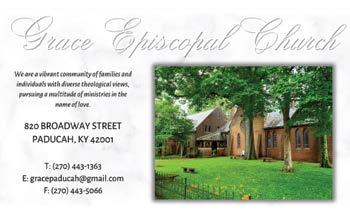
JACKSON HOUSE APARTMENTS
W.B. SANDERS RETIREMENT CENTER
301 S 9th St, Paducah, KY 42003 (270) 442-7591
LONE OAK MANOR APARTMENTS
650 College Ave, Paducah, KY 42001 (270) 554-0504
McAULEY MANOR
631 McAuley Drive, Paducah, KY 42003 (270) 415-9166
MERCY MANOR
601 McAuley Drive, Paducah, KY 42003 (270) 415-9166
TRIGG CO.
EMMA ROSE SENIOR APARTMENTS
149 CS-1089, Cadiz, KY 42211 (270) 512-5690
MASSAC CO.
MASSAC COUNTY HOUSING AUTHORITY
1209 E 5th St Apt 5G, Metropolis, IL 62960 (618) 524-8411
OBION CO.
SOUTHSIDE MANOR
722 Broadway St, South Fulton,TN 38257 (731) 479-3877
PARK TERRACE VILLAGE
Park Terrace Cir, South Fulton,TN 38257 (731) 479-1321
WEAKLEY CO.
WESLEY AT MARTIN
448 Hannings Ln, Martin,TN 38237 (731) 587-6324


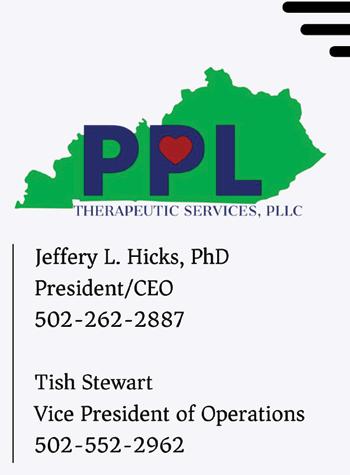
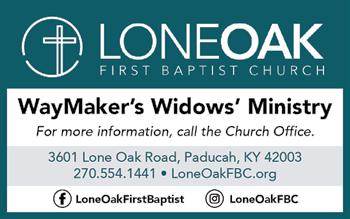

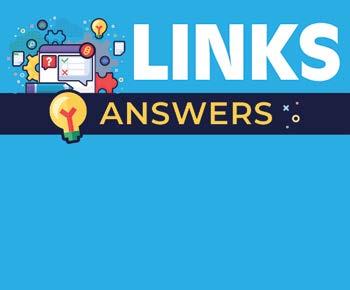
PICKLEBALL TERMS: Kitchen, Falafel, Chop, Dink
WORDS ENDING IN “OFF”: Bake, Blast, Cast, Drop
ONE-WORD TV TITLES: Arthur, Benson, Bones, Catfish
COOKING TERMS: Coddle, Dredge, Cure, Brine

PURSE STYLES: Clutch, Hobo, Change, Shoulder
CARD DEALER ACTIONS: Riffle, Deal, Cut, Fan
MANICURE STEPS: Buff, Sand, Soak, Shape
TV NETWORKS: Outlaw, Defy, Busted, Grit

Financial constraints should never hinder seniors from obtaining the essential resources necessary for their daily lives. Through your generous contributions, the Embracing the Aged Foundation has made a meaningful difference in the lives of many seniors.
“Embracing the Aged went far beyond the call of duty. My Autistic son and I were without hot water for months due to not being able to afford a hot water heater. Embracing the Aged Senior Services, came out to my house, got measurements and went to purchase a brand new one and delivered it to us in a timely manner. Thank YOU O LORD for people who care and are concerned about aging. Thank you again, Embracing the Aged Senior Services.”
- Anonymous
Embracing the Aged came through when I needed help getting my Service Animal to the Vet. I had no money and no way to get there because I am in a wheelchair, but within one hour, they came through for me. She was late getting her shots, and that meant she couldn't go with me to my Doctor's Appointments. Thank you with my whole heart for making getting Karolina to the Vet Possible. I can never thank you enough. You certainly are Angels.
- Cheryl Lynn and Karolina Kiebler
“Embracing The Aged Senior Services was able to assist a local resident with transportation to a vital medical appointment. They partnered with a local transportation service and covered the cost for the resident. This was such a blessing and it met one of the primary needs in our local community. Thank you for Embracing The Aged!”
- Janet Ashby
